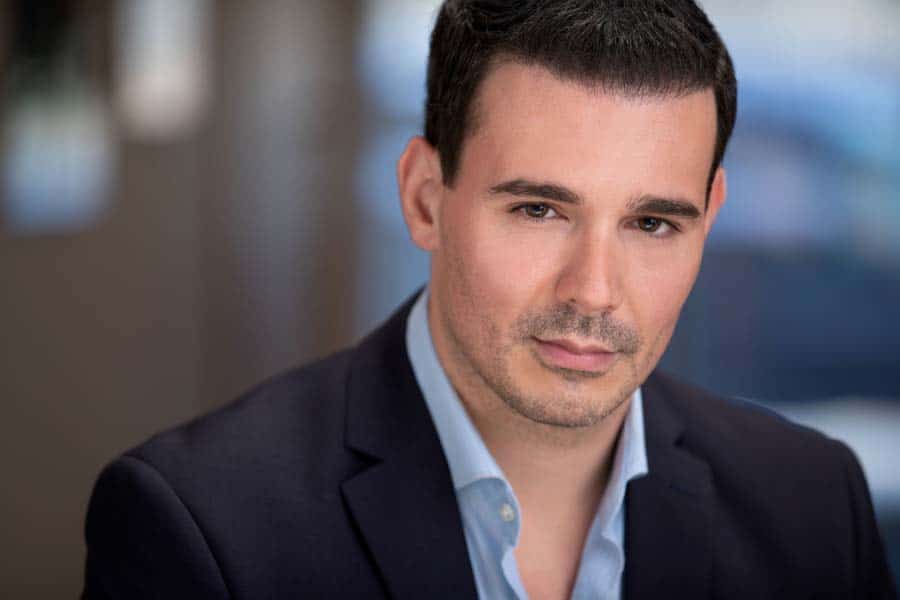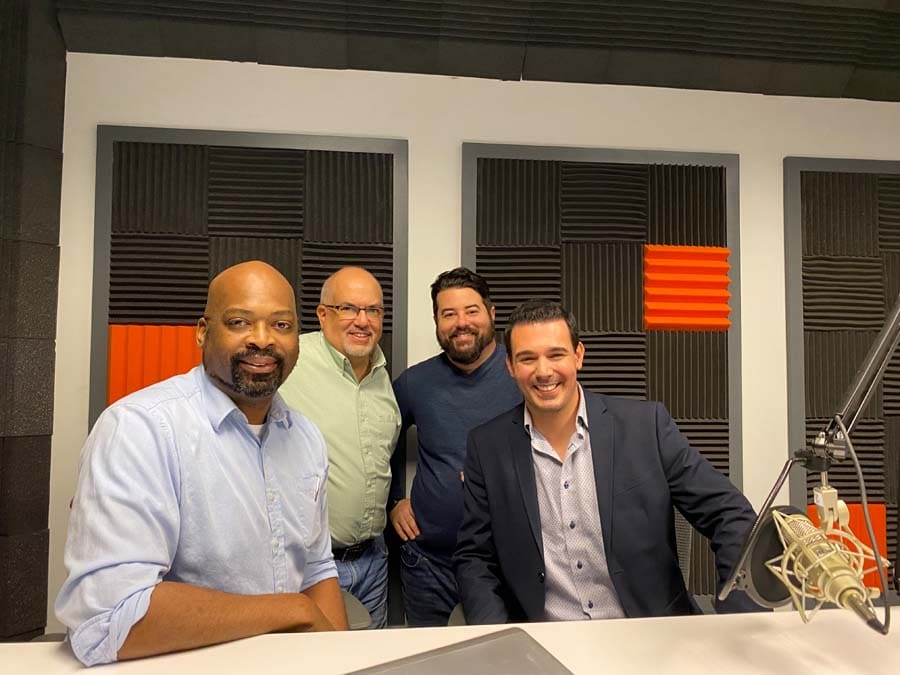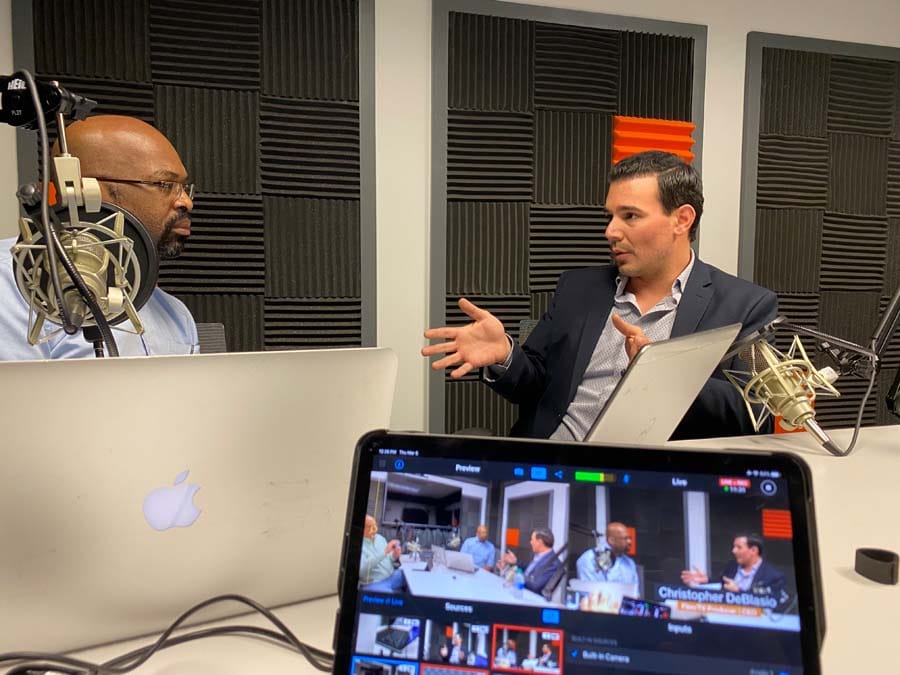Business
Capitalist Sage: Chris DeBlasio Talks about the Film/TV Business [Podcast]
Published
4 years agoon
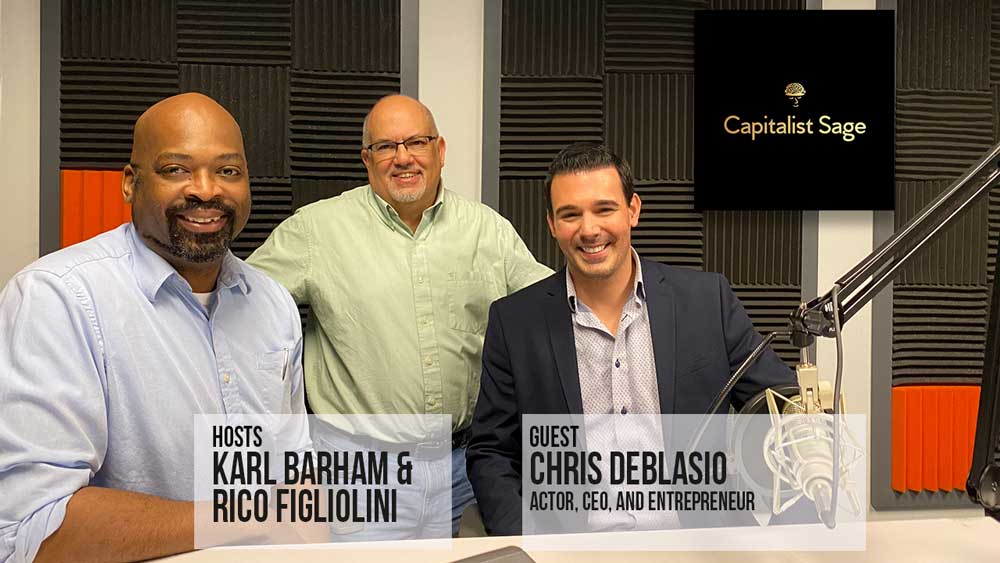
This week on Capitalist Sage podcast, Karl Barham and Rico Figliolini sit down with Actor, CEO, and entrepreneur Chris DeBlasio. CEO of Agency850 and experienced producer and actor, Chris shares his expertise in the areas of digital marketing, product placement, and more.
Resources:
Social Media:
@ChrisDeBlasio
Website: http://www.agency850.com/
“So I always say there’s a time to document and there’s a time to create. So documenting could be anything from your smartphone. You know, you’re documenting your day, you’re giving maybe a message or something like that. Everybody’s got a phone in their pocket with a camera, right? So there’s no excuses. You can document your day. It’s content, you’re pushing content, and then there’s creating an actual show or podcast.”
Chris Deblasio
[00:00:30] – Intro
[00:05:03] – Chris’ Backstory
[00:07:09] – Growing the Business
[00:08:52] – Importance of Mobile Sites
[00:10:41] – Including Videos in Your Marketing
[00:12:42] – Working with Clients
[00:14:03] – Video for Businesses
[00:18:21] – How to Get Started
[00:22:51] – Tagging
[00:23:38] – Product Placement
[00:27:46] – Short vs. Long Content
[00:31:33] – Closing
Chris DeBlasio, CEO, actor, producer and entrepreneur L-R Karl Barham, Rico Figliolini, Kris Dress, media director for Agency 850 and guest Chris DeBlasio, CEO, actor, producer and entrepreneur.
Karl: [00:00:30] Welcome to the Capitalist Sage Podcast. We’re here to bring you advice and tips from seasoned pros and experts to help you improve your business. I’m Karl Barham with Transworld Business Advisors, my co host is Rico Figliolini with Mighty Rockets, Digital Marketing, and the publisher of the Peachtree Corners Magazine. Hey Rico, how are you doing today?
Rico: [00:00:47] Hey, Karl. Good.
Karl: [00:00:48] Well, why don’t we start off by introducing our sponsors. Let’s do that.
Rico: [00:00:52] First thing is we’re at Atlanta Tech Park in the City of Peachtree Corners, and this is the podcast studio within that. It’s an accelerator. Some people know incubators better. It’s a place where 90 businesses are here. Startups basically. And it’s a facility that not only houses these startups, but also provides Financial Fridays. Wine Wednesdays for those that want to network. Well, it’s an opportunity to really meet a lot of people. But Atlanta Tech Park is even more than that, right? Cause they have a reach into the Southeast through the venture capitalist funds that they work with. So it’s a great place to be able to network and possibly even get venture capital introductions. And if you need to, event spaces.
Karl: [00:01:37] It’s a perfect course for the building and a beautiful ecosystem which brings entrepreneurs from different backgrounds, different types of businesses. With here, the Southwest Gwinnett chamber, there’s bank sound site or PR business consultant advisors, marketing experts. So, you know, just going through the hallways, you get all these different viewpoints to help you improve your business.
Rico: [00:01:58] And the businesses here, once they get bigger, like Reavis and some others, they expand out and take office space in Technology Park actually, which is where we’re sitting and we’re actually sitting on the Curiosity Lab in Peachtree Corners, right?
Karl: [00:02:12] The one that, while it’s the autonomous vehicle track, the living lab, where now there you’ll see scooters starting to appear out there. These scooters that are able to return back to a spot. You could order them by phone. So this entire environment just really brings out entrepreneurial innovation and we’re just glad to be here with the podcast.
Rico: [00:02:31] With the autonomous environment, smart city, the whole nine yards. And the funny part is, well, not the funny part because really it’s 5G enabled through Sprint. So it’s wireless, it’s IOT, it’s internet of everything. It’s lights talking to cars, cars talking to the apps and living environment with people across industry cars and moving in and out. So unlike a lot, any other place actually in the country, almost as what this is, but the backbone of it is our lead sponsor and that’s Hargray Fiber. You’ve got to bring the internet into the place. You don’t have to do the 5G enable, right? So Hargray Fiber does that. They are the backbone of Curiosity Labs.
Karl: [00:03:09] Atlanta, you’re going to absolutely go. Glad to have the FTE. If you think of the infrastructure that’s needed to power this. And if you have business services that you need and wireless and internet and so on, they’re a great company to reach out to and help you with all those needs.
Rico: [00:03:26] Absolutely. So if you want to find out more go to AtlantaTechPark.com for this place, and also HargrayFiber.com if you need an enterprise level or even small business level of fiber solutions where they can bring in and customize solution. By the way, they’re local, which means you’re not the only with the cable guy, so you have someone right there and they’re really involved in the community. So something good.
Karl: [00:03:50] That’s one of the great things about Georgia. There’s all these companies and industries that are thriving and one of those that are, that’s really taking off right now with the entertainment industry. I think in the last two years, Georgia was at worst second, if not first place in a number of films produced here. A lot of the Marvel Disney films are produced here and filmed here, and it’s really driven the economy of the area. And there’s going to be a generation of entrepreneurs and business people. That’s going to grow up in this ecosystem. That’s going to be creating new movies, new production, just like Hollywood was maybe 50, 40, 50 years ago. Atlanta is the Hollywood of the South, and today’s guest is Chris DeBlazio. he’s with a local entertainment and production company, call agency Eight:Fifty Entertainment. He’s got a great background both as an Actor in films working in industry, and he’s been able to merge his passions around the entertainment industry with entrepreneurship and some really creative ways. And so, Chris, I wanna thank you for joining us today and welcome to the podcast.
Chris: [00:05:01] Thank you for having me. I appreciate it.
Karl: [00:05:03] But I’d love to start off with, why don’t you tell us a little bit about yourself and how you got into this area of the business?
Chris: [00:05:10] Yeah. Well, originally I hailed from New Jersey. So I started out actually in advertising. I sold yellow pages. So, did that throughout Jersey, New York. I’ve always, I’ve always had a knack for sales. You know, I did really well at that, but I had a passion for that. Film and television business and, and you know, an advisor came to me and one of my really good, good friends said, Hey, you know, you know, you’re only going to be young once, you know, you’re living so close to New York, you got to go do it. You know? So, I went to school for film and television in Manhattan. I studied both sides of the camera. I had a bunch of private coaches, as an actor. And fortunately, I was hired by ABC, early on and, and, it was on the soap opera called One Life to Live for a while. And bounced around on some of the, some of the New York shows. And then I got the bug. And so in a, in 2007, I moved out to LA to do more movies. I just didn’t want to get pigeonholed as a soap backer, so I went out there and that was during the writer’s strike. So perfect timing, you know. But, so it was, it was a little bit difficult because work started drying up and, and, you know, a lot of the shows just kind of stopped. And so for
me, I, I never, I never, you know, bussed tables or anything like that, and then if there was anything wrong with it, I’ve just always had an entrepreneurial spirit. And so I always had to figure out, well, how am I going to make a living doing this? So in 2007 when smartphones were becoming pretty popular, I noticed that there was another need that websites weren’t fitting on them, right? The print was really small. You’d do that pick and zoom thing to make it larger. And a lot of people in the entertainment business came to me and they said, Hey, is there anything that we can do about this? So what I did was I hired a bunch of developers. And I created mobilized websites for people in the movie business and it took off. And so we started doing some marketing for people, in the movie business out in LA. And that’s actually how the ad agency started and started adding products and services, and it just grew from there.
Karl: [00:07:09] Wow. So when you started, you saw what the future was happening, how mobile started changing the dynamic. What were some of those early trends and things that you saw you tapped into that helped you grow the business?
Chris: [00:07:24] Well, back in 2007 you got to remember QR codes. So, yeah, and I, you know, I thought this was quite interesting. You know, I didn’t know where it was going to go, but I’ve, I’ve always. I always try to look ahead. You know, that’s, I’m a visionary by heart, so I’m always looking at, all right, what’s, what’s coming down the line. And, and so whether it was the QR codes or definitely it was the mobile websites, because that’s where the future was going. There was more smartphones being made and shipped. And so I said, okay, well this makes sense. So what I did was, I utilize those QR codes on the back of DVD boxes and the back of actor’s resumes. So when you scan it, either an actor’s demo reel pops up or the trailer of the movie, and this was when we were really pushing, this was when DVDs were still relevant, right? So, so you can go to, you know, a blockbuster, which is not even around anymore, right? But you can go to a video store and pull these from the shelf and that scan it. See what that movie’s about on the, on your phone. So, I mean, you know, fast forward to today, QR codes never really got to where I guess they were trying to get to. I mean, you see them around, there were more, but they’re not really utilized like they were. So that was kind of like a catalyst and me kind of getting into learning more about mobile, more about, you know, the, the marketing end of, of, you know, how to, how to reach people, where they’re at and they’re at on their smartphones.
Rico: [00:08:52] For sure. I mean, most people, I mean, most websites, so 60 – 70% of the traffic. And for most things, it’s all the traffic.
Chris: [00:09:00] Right?
Rico: [00:09:02] And the trail is probably all the traffic, almost like 90%. Karl: [00:09:04] It’s so true. It’s unfortunate when you’ll see a lot of business owners websites and they’re not optimized for mobile, and how do you help them make the argument of the investment to right size their websites so that it could attract the most, don’t think they need to?
Rico: [00:09:24] Or even to make that decision to develop the website as mobile first.
Karl: [00:09:28] Right, because you don’t have…
Rico: [00:09:29] It doesn’t give me mobile for us because of how much traffic. Do you get through the desktop portion? And it depends on whether the business, the business even.
Karl: [00:09:37] And who’s really looking at that.
Chris: [00:09:39] Cause sometimes it’s, it fascinates me because I mean there is, there’s way more traffic going to the mobile version of your website than there is on desktop. It’s just, it’s the way. Is the way that we are now. It’s the way the world is, you know? And so there’s several reasons why you would want to make sure that your website is more firm. And one of the biggest things is Google, several years ago, released an update saying, “Hey, if your website’s not mobile optimized, you’re not going to get ranked as well.” You know, so, there’s a lot of relevancy, you know, there are Google’s all about, you know, making it very, very user friendly there and making the most relevant information pop up first. And if your website’s not mobile optimized.
Rico: [00:10:20] It’s talking about video to them and you can, you’ve heard of site maps. So sitemaps are essentially for the website, but there’s video site maps also. So if you have you on video, you want to be able to do a video site map. I mean, he’s just, this way, Google knows that you’re there and that’s how you get those strings up. The carousel videos that pop up sometimes on your Google searches because of that stuff.
Karl: [00:10:41] So has everybody started moving more to mobile and along with that, it’s just an explosion of video. But even though a video is exploding, the use case of video tends to be limited in certain areas, the music industry and, and the entertainment industry obviously is far out ahead on that. When you start looking at more main street businesses or even professional services, folks that might be the brand with for their business. I don’t see them leveraging a fraction of the capability of video. How do you, how do you help people bring that into the picture video?
Chris: [00:11:21] And we’ve been saying this for several years as video is King, especially in a marketing capacity because you’re, you know, you’re, you’re hitting in the visual, you’re also hitting the audio. And if it’s done properly, you’re also transcribing all these videos. You actually have the written word as well. So with one medium, we have one main medium, which would be the video. You can reach all the markets, you can reach podcasts, you can reach the audio, you can reach the written word if it, if everything is transcribed, right. So, our philosophy in our company, one of the things that we do is help with personal branding and help people to help push content is that we want to make sure that they’re found everywhere. And, but we always start with video. I mean, it helps. All my guys are movie guys, you know, they’re all, they’re all
TV guys and producers and stuff like that. So it’s in our wheelhouse. But, but yeah, video in, no matter what business you have, you’ve gotta be leveraging video. And, and there’s also the search element too, because that is where everybody is consuming confidence. The most amount of content consumption is video on the web. So those things are getting ranked higher. So if you have a recurring video, you have constant video and updates on your website, that’s also going to help you rank higher. So it’s very important for any business owner, to leverage video in, in the capacity.
Rico: [00:12:42] How are you as a business, as a business, as an agency? How are you finding your clients? And when you bring them in, what is it that you do?
Chris: [00:12:51] So there’s two sides of our company, right? So, one side of our company, you know, we work in the movie business, so we do like product placement, product integration, we do a lot of branded entertainment stuff. We’ll do marketing for the movies. And then the other side is personal branding, personal branding, specifically for CEOs and creating thought leaders. So what we find is that, people know that they’re supposed to keep an updated LinkedIn profile. They’re supposed to be posting, they’re supposed to be liking, but a lot of times either A, they don’t know how, or B, they just, they just don’t have the time to do it. And they need somebody to help them, you know, stay accountable and push content. And so that’s the other side of our company that we focus on is helping people, helping specific CEOs. Push content, creating their own podcast and the value of creating their own podcast, the value of creating their own show, you know, and creating recurring content because there’s so many, so many different things that, that, you’re able to do with video, with podcasts. I mean, it helps your brand image. If it helps, you know, equity and, you know, brand equity, your brand equity. And, and, and ultimately, people do business with who, they know, who they trust.
Karl: [00:14:03] So I’m, I’m curious, I want to peel that back a little bit. So specifically what type of businesses could really, you’ve seen really can take advantage of bringing video into how they present themselves to the public.
Chris: [00:14:20] I firmly believe it can work in any capacity because no matter what industry you’re in, you are a thought leader in your field, right? You could be a thought leader in your field, and sometimes the more obscure thing that you’re doing, the more narrow the market. And if you’re the only one in that market pushing content, you literally could capitalize on that market. But I find like a lot of people. Like speakers and business coaches and attorneys and plastic surgeons, like people that would buy you as the service even more so, you need to be branding yourself because they’re buying you.
Karl: [00:14:54] So I’m curious, I’m going to play that out. What did we say? I’m going to pick a field like accounting. Right now we’re getting into tax seasons and all the accountants heads are down. I’m working on people’s financials. How would an accountant leverage video, digital media, some of the things that you’re bringing from the entertainment industry, how can they leverage that specifically to brand themselves to drive leads. What would that look like?
Chris: [00:15:23] I’m even so somebody in accounting and finance, right? I would, I would, I would say start a finance type podcast or finance type show, much like this, right? So we’ve got audio going, but we’ve got some cameras going. We’re hitting live, right? Doing that, but doing a finance show updates and, and you know what’s going on, you know, far as tax updates and where the different codes are coming in, whatever, right? It’s spreading your knowledge. And there’s a great deal of wealth behind that in, in, in value to where you’re developing yourself as a thought leader. People are getting to know who you are because they’re getting to see you constantly, right? Cause you’re always putting out a show. But then also guests on your show, we were kind of talking about this a little bit earlier, is like, it’s a great way to network, you know, and, and I don’t know about you guys, but you know, networking events like they’re, they’re overwhelming. And, and, and I think some people can argue, especially in the accounting field, that the numbers driven people that are there are got their heads down. May not have the time to go out and network and do that. So if you have a podcast, you’re inviting guests on your show, that could potentially be leads for you.
Rico: [00:16:29] It’s more passive.
Chris: [00:16:30] And it’s passive. It’s not a sales pitch. Exactly.
Rico: [00:16:34] Discussing ideas.
Chris: [00:16:35] Exactly. Yeah. Partnerships and stuff happen that way.
Karl: [00:16:38] So how can you leverage? So one of the things that, in the entertainment industry. They leverage quality storytelling and there’s other things that make something interesting. When I’ve seen people do, do it yourself videos, they could be, I don’t know if the right term is two dimensional. How do you make it three dimensional? How, what are some tips you could offer somebody if they said that, I’m going to do a podcast from a new something video? What is it that the audience is going to want to see?
Rico: [00:17:07] The elements from things could be actionable that they could actually do themselves, like aside from your expert opinion.
Chris: [00:17:12] So I always say there’s a time to document and there’s a time to create. Right? So documenting could be anything from your smartphone. You know, you’re, you’re, you’re documenting your day, you’re giving maybe a message or something like that. Everybody’s got a phone in their pocket with a camera, right? So there’s no excuses. You can document your day. It’s content, you’re pushing content, and then there’s creating, creating an actual show or podcast. And the way our agency does it, and the way we help, you know, CEOs launched their podcasts is that we start with the video, we record the video, we record the podcast, right? But then we also transcribe it. So you’re hitting your market any which way they consume content, whether they watch, whether they listen, whether they read. And so to, to add, an element of, of,
you know, Hey, there’s, there’s more ways to consume the content. That’s, that’s what they should be doing is you’ve gotta kinda, you gotta be everywhere, you know, and making sure that it’s not just a, either a one platform or one specific market that consumes content a specific way.
Karl: [00:18:21] What about, if I, if I were, someone were to launch a new company so they may not have the track record. You, your experience in launching a company. What are some things that would, working with some entrepreneurs who are all in starting up their company and the common conversation came up about funding for marketing. So when they’re starting, they’re really tight on it, but every, every one of them thought they would have something that would go quote-unquote viral, but they didn’t really have a budget to fund it. They didn’t understand. Even thought about things like crowdfunding, like, you know, I can crowdfund or, or to to, to get funds for visits. But they didn’t realize the marketing and, and, and there’s some need to go into that.
Rico: [00:19:05] Go on Kickstarter or something similar, which is, I don’t know.
Karl: [00:19:09] GoFundMe, Kickstarter.
Rico: [00:19:11] If you don’t have the social presence, it’s really hard to get that going, but then you slot it and people will come.
Karl: [00:19:17] And so what’s the pre-work if you’re going to, if you’re sitting here thinking about launching something in the next three years, what are things you can do before that? So you build up, whether it’s an audience or, or some kind of credibility to prepare you for that.
Chris: [00:19:32] The biggest thing is just, just get started. Most people just keep putting it off and putting it off because, Oh, you know, it, you know, timing’s not right. Or, you know, it was just on the holidays and I gained five pounds, I don’t want to be on camera. Like there’s, they find an excuse for anything. And the only way that you’re going to build an audience is if you just get started. And most people just find excuses to not get started and you don’t have to wait for the best equipment and the best lighting and it. Just get started because you have zero audience. Yeah, I’ve got nothing to lose. You have everything to gain. And so everybody starts from zero. I did not have any type of social media or any type of Facebook, nothing Instagram, nothing five years ago. And which is surprising, right? To some people because, but for me, I was always in front of the camera. I avoided social media. I said, I asked my private life, you know, no one needs to do that. So I had a lot of catching up to do until I realized it was, it’s a business tool. So I immediately got started and my, my first videos, like everybody’s first videos is crap. It’s like, it’s just expect it that it’s fine, but you’re building upon it and the only way that you’re going to build an audience is content over time. And that’s the thing. The moment the world is different now, the moment you post the video. The next couple of days, it’s irrelevant. It’s got to be constant videos. It’s got to be constant contact, putting out on social media, and you’re, it’s compounding over time. The biggest thing that, that, you know, people just, they don’t get started.
Rico: [00:21:06] Do you find that when you’re doing something like that, I mean, you’re building a series of videos for a client building their brand? Is it each one of them should be answering a specific question? I mean, how do you get through that?
Chris: [00:21:19] I tell, I tell every, every business owner, or you know, marketer out there is understand your audience because you know, if you’re not, if you’re not targeting the right audience, you’re, you’re falling on deaf ears, right? You’re just pushing out content and it’s just, it’s not specific. So understand who your audience is, who’s going to be consuming your content, and also what platform they’re consuming content. It’s people are in a different frame of mind when they’re on Facebook as opposed to LinkedIn, right? You need to know how to speak to that audience as well, so it’s more than just putting up a generic video and that’s it. There’s tagging, right? There’s different things. And the more specific you can be to speak to that end consumer, the more effective your content is going to be.
Rico: [00:22:08] Should you always have a call to action to do things like that?
Chris: [00:22:12] Well, I mean, it depends on the piece of content, right? So what I always say is, there, no one wants to be sold. No one ever wants to be sold, right? The only way you can get leads or you can build a really good audience on social media is two ways. Educate or entertain. That’s it. You’ve got to provide value or entertain that person. And once that happens, that the credibility and the trust starts happening and then they start following it. And then eventually, because they’re interested in you, they’re interested in your product service. Eventually they may buy it from you. And that’s how it works.
Karl: [00:22:51] So you mentioned a couple of things. You said, you said a term tagging. What? Define what tagging is and how do people use that?
Chris: [00:22:58] So, I mean, there’s, there’s hashtags, there’s tagging people in posts. There’s different things. You know, you, you, you want to look at, number one, what is, what is it that you’re talking about? And highlight those things, you know, inside some of the, some of the content, right? So if you say you’re doing a leadership video and you’re talking about team building, you know, hashtag team building, hashtag entrepreneurship, hashtag whatever, right? Business coach. Those types of things. Because when, when somebody is, is searching for content, a lot of times they’re using hashtags or they’ll see what other hashtags people are following and you can get discovered that way as well. So it’s very important to make sure you have good tags.
Karl: [00:23:38] Using, using tags, hashtags and other ways to be able to tag. One of the things that you work on is product placement in films and TV and so on. I remembered, years ago. When folks started watching, TiVo on demand, people stopped watching commercials and you’d watch shows like in the middle of the show, in the Southern Coca-Cola camp out there, and that was the way they started doing it, so that it was obvious, at the time and now you could see
where it’s becoming more commonplace. Tell me a little bit about how that evolved today. How are people using product placement?
Chris: [00:24:20] Really, who watches commercials, you know? I mean, every time that skip button comes up, even the five seconds is painful for a lot of people. It’s like you’re hitting it before it even counts down, right. That happens a lot. And, and the thing is, I think what advertisers need to realize is the whole dynamic has changed because of on demand type content. And again, being, you know, being a visionary, I always look to, okay, well where is the advertising going? Well, as a company, you know, we can ingrain you in the narrative. The person is interested in the content that we’re watching, but we’re ingraining your advertising into that content. It’s going to make a lot stickier customers. Because if the chances that they’re watching, you know, your show on traditional cable and, and you’re watching a show on traditional cable and then a commercial comes on, they happen to drop their phone, their remote falls off the other end, and they get somehow chained, you know, to the bed or whatever, you know, that was forced to watch that commercial. That’s the only way they’re going to say it, right. And they’re not hungry. They don’t get up the gate.
Karl: [00:25:26] If you give us some examples where, you know, film or anything that people might’ve seen where you saw it done really well? What is great in integrating?
Chris: [00:25:36] There’s, there’s like great classic, classic examples. So if I say a candy company and an alien, what movie do you guys think of?
Karl: [00:25:46] E.T. right?
Chris: [00:25:48] Yep. Perfect. Right now, most people don’t know Reese’s pieces was going out of business. That movie saved it. That movie saved that because then that movie became synonymous with the candy. So, so there.
Karl: [00:26:02] I remembered, do you remember the matrix. Do you remember the cars that they were in this big chase scene and then maybe with the second major, do you remember what the cars were? So they were all general motor cars. They were Cadillacs, a general motor car. If you remember the bond films, early ones, Aston Martin. And there was two films that were BMW. But you’ll remember those things. And if you want to be James Bond, like that might be the car. Do it. How did that translate with, so you’ve got more video being produced, YouTube and all these different channels. Can product placement work in those mediums? Chris: [00:26:42] Oh, absolutely. Yeah, absolutely. Because people are consuming content specifically on YouTube, you know, digital content, you know, you can, we do something called branded entertainment, right? So as an agency, we can go to a company or a business and create a show, a narrative type show wrapped around the business. You see this in reality shows all the time, right? I mean, there’s always a business involved somehow, but it’s a lottery ticket for a network to come to you and say, Hey, we want to do a reality show in your business.
Right? So, so a lot of times clients will hire us to say, Hey, we want to do a reality show. So we literally script out shows and then we put it on air. But it’s advertising, it’s paid advertising.
Rico: [00:27:27] How do you handle influencers? Do you do a deal with them all?
Chris: [00:27:32] Yep. Yup. So, I mean, influencers right there, they have sponsors, right? And so there’s, there’s content and, and sometimes we even use influencers and some of the projects that we do, it’s strategic, right?
Karl: [00:27:46] That’s interesting. I wonder if, you know, you imagine, a business owner creating a show, maybe posted through YouTube. They do something around that, and it could be around the problem they’re solving, you know, homeowners, repairs and home improvements and those types of things. I remember seeing on YouTube once someone did, you know, you Google repairs, fix a toilet, and you could find some videos on how to do that. But one did a really great job of explaining how to do things. Well, I remember watching and maybe, replacing a faucet handle. It was 15 minutes watching him do it, and then it gets to the part where he said, well, take this out. It’s just make one big twist and you pull it out. And I walked him for about five minutes trying to get that, my conclusion from that was. I’m paying somebody to do that because it’s a great way to get there. I’m fast, I thought I could do it myself, and I’m watching this video, which is just a simple YouTube.
Rico: [00:28:47] It’s funny, whenever I sort stuff like that, I filter it for three minutes and know that they cannot sell how to do that.
Karl: [00:28:55] But it’s a great lead gen because once you realize you can’t do the thing for time, money, knowhow, skill, expertise tools. Then now you’ve got the problem and whoever, if they, if they could tag that or if they can lead you to them.
Chris: [00:29:11] Well, we always tell people, give your best stuff for free. Just put it out there because that’s what’s going to happen. People are going to be like, wow, this guy really knows his stuff and keeps following, keeps following, and then eventually like, man, I’m calling this guy, you know, or girl, right? It’s like they know their stuff. And, and so by putting out that content and the whole, it’s fun cause I’m exactly the same way, you know, short video. Give it to me. I’m looking to do something I need a quick, yeah, let’s, let’s talk about that long format versus short form content, right? Some people like watching the entire 14 minutes. That would drive me insane, right? Some people need it quick. Need it now. So there’s ways that you can, and we do this in the agency, is we’ll develop content where you have long enforcement, but then we also have short bite size pieces of content. So now you’re capturing the audience that likes the short form content, but also, specifically podcasts, that’s long format. You’re sitting in Atlanta traffic. It drives me nuts if the podcast is only three minutes right. Because I’m going to be in traffic for another 40 minutes, right? So, so having long form content, there’s, there’s a time and place for that as well.
Rico: [00:30:18] And also, I think, you know, when you’re, when you’re doing that little form content, Instagram doesn’t work that way, right? So you’d want something shorter. So taking those snippets out, and actually maybe do you, repurposing that one podcast, you have four or five different posts.
Chris: [00:30:32] Yep. That’s exactly what we want to do. Yeah, that’s exactly what we do. So, so we’ll, we’ll get long form content and then we’ll take the best pieces of content out of that entire episode and that’ll feed the content machine for weeks.
Karl: [00:30:45] I’ve found one thing they started doing recently and sharing with other business owners, if you were talking about capturing. What you’re doing day to day. So if I go to an activity, it can be a voluntary community thing. I try to remember too, I used to just snap a picture and post, but Rico, you helped show me and I now take a small video and I only go for 30 seconds if, if that, and post the video piece of what’s going on in that activity and I see a lot more response to that video. So I have the mix of, you know, still versa video.
Rico: [00:31:22] Kimball’s $10 for an iPhone. I have one. I use it all the time.
Karl: [00:31:28] Yeah, it’s amazing. So these are small things that anyone can do.
Chris: [00:31:32] Instagram stories are huge.
Karl: [00:31:33] But, but if somebody wanted help with this, you know, where can they go and learn more?
Chris: [00:31:38] So, I mean, to, to find me, you know, @ChrisDeBlasio on any social media platform, you know. Just, Chris DeBlasio, that’s me. Agency 850. So Agency850.com is the company. So yeah, you can find us, find us on any social media platform at this point.
Karl: [00:32:00] So I’m curious, you know, you know, you’ve been busy and so on. Do you got anything coming up or going on where folks, you can learn more about what you do?
Chris: [00:32:09] Yeah, well, I mean, we’re, we’re constantly doing new shows and constantly creating, you know, shows for thought leaders and, and, and whatnot. So, we’re releasing that stuff digitally. I mean, on the movie side, I do have a, a couple of projects that we’re working on, unfortunately, under NDA. I can’t say anything on as, as this episode, but maybe we’ll do a follow up. But we do have an Atlanta based series that just got Greenlight.
Karl: [00:32:33] Oh, fabulous. Well, I want to thank you for coming out and chatting with us. We, you know, I always like, you know, looking at how to improve a business from a different angle and there’s things that, you know, the entertainment industry, Hollywood films done really well. And when I see small businesses, at times it could feel it’s an arm length away. But, I’m learning
that as technology changes, as people’s tastes changes, people following YouTube series just as much as they are or something on Netflix and so on, if it speaks to them.
Chris: [00:33:09] There are more people that are following the Joe Rogan experience than there were that watched the Walking Dead. Yeah, I mean, the, the, you know, podcasts and recurring content, especially digitally, the, now’s the time to get on it. And if you don’t know how to do it yourself, there’s companies like ours that do it.
Karl: [00:33:25] Oh, that’s fabulous. Well, thank you very much for coming in and we want to thank Atlanta Tech Park again for hosting the podcast. It’s a great place to come and work with other entrepreneurs network, attend some of the events here. If you’re looking for a great environment and place to work and, it’s a good place to come and check out and get a tour and see if that, if that works for you. I’m Karl Barham with Transworld Business Advisors. You know, it’s been a pleasure to work and, and work in the, in the Georgia Metro Atlanta community, helping business owners figure out exit strategies for the business when it’s time to sell. We have a team in place that can help them do that, but even if they’re not ready to sell. And we’re able to help advise people on the best thing they can do to increase the value of their business. So if you ever wanted to consult with somebody around that, just reach out to www.TWorld.com/AtlantaPeachtree. Schedule an appointment, one of our consultants. Rico, why don’t you tell us a little bit about what you’ve got coming up?
Rico: [00:34:29] So if you want to find me, LinkedIn, Rico Figliolini or you go to MightyRockets.com. If you’re looking for some portfolio stuff from my end, I do everything from product videos to social media content and branding, so you can find me there. Also produce Peachtree Corners Magazine. Its a magazine in the city of Peachtree Corners, this coming issue, we’re gonna hopefully if everything works well. Outcome is stories about youth sports, that some of the stories in, they’re doing good homegrown nonprofits. And I’m recovering these other stories. I mean, every issue is, hopefully chock full of things that you can go to LivingInPeachtreeCorners.com to learn about that.
Karl: [00:35:10] Absolutely. Follow us on all the usual sites. Facebook.
Rico: [00:35:14] Well, if you’re not seeing this on Facebook, go to Peachtree Corners Life, like that page, and then you’ll get alerted when we go live or go to Instagram and you can find us by searching the Capitalist Sage. You’ll find this there, and just follow that.
Karl: [00:35:31] Please subscribe to us on iTunes.
Rico: [00:35:34] iTunes, iHeartRadio, Spotify, SoundCloud, YouTube, Stitcher, I think it’s up for something. I forget what it’s called, but anywhere you find the podcasts were fed out there.
Karl: [00:35:46] So just follow and subscribe and share with other folks. If you’ve got folks that are busy, if they’re stuck in traffic, if they want a bite size amount of information about different things to help them improve their business, check out the Capitalist Sage.
Rico: [00:35:58] And leave a review too, because that will help get us up in the rankings.
Karl: [00:36:02] Yeah, absolutely. Well, thank you everyone. We’ll look forward to chatting with you and bring you more great guests. Thank you, Chris.
Chris: [00:36:08] Thank you.
Rico: [00:36:09] Thanks guys.
Related
Business
The Forum Gives Sneak Peek of New Eateries and Community Spaces
Published
2 days agoon
July 24, 2024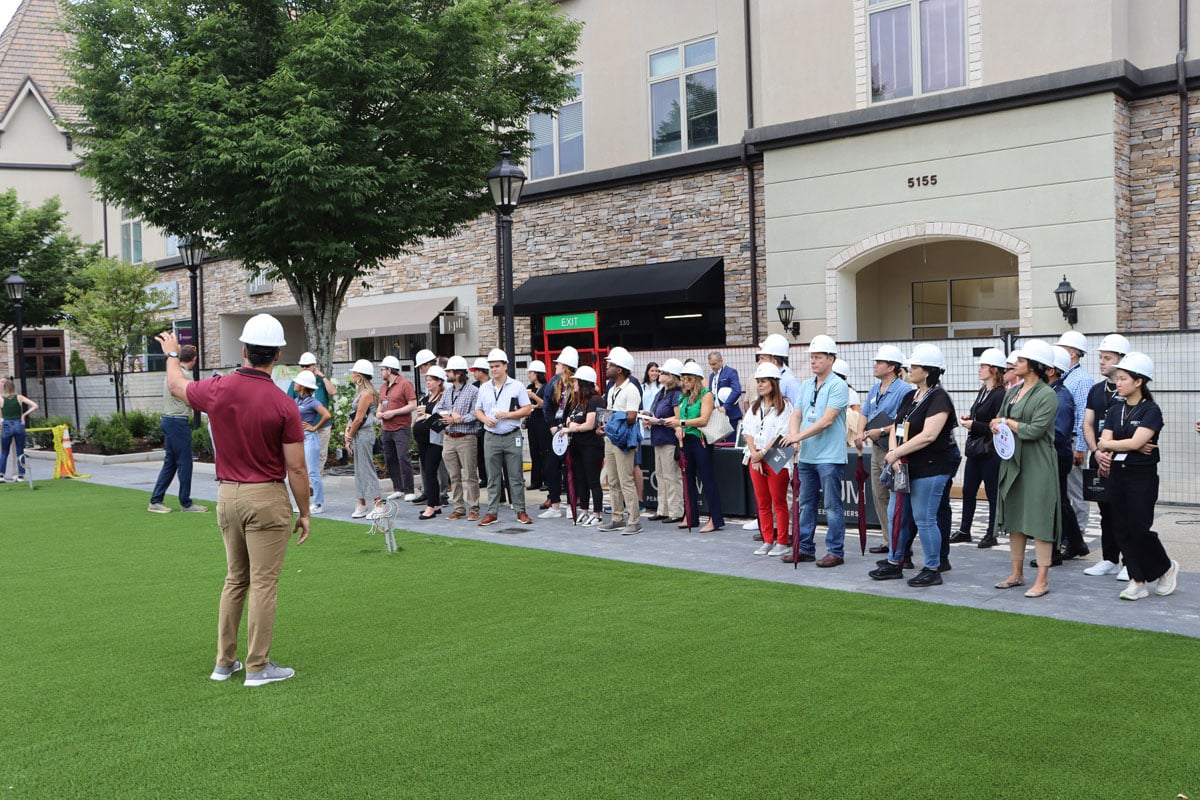
If you’ve been to or near the Forum in the past few months, you’ve probably noticed cranes and construction crews. The anticipation of the first phase of renovation of the 22-year-old retail center has left a lot of Peachtree Corners residents as well as nearby patrons excited to see changes.
The Forum administration invited the media for a hard hat tour on July 17. The event showcased the redevelopment progress ahead of The Plaza’s grand opening on Aug. 8.
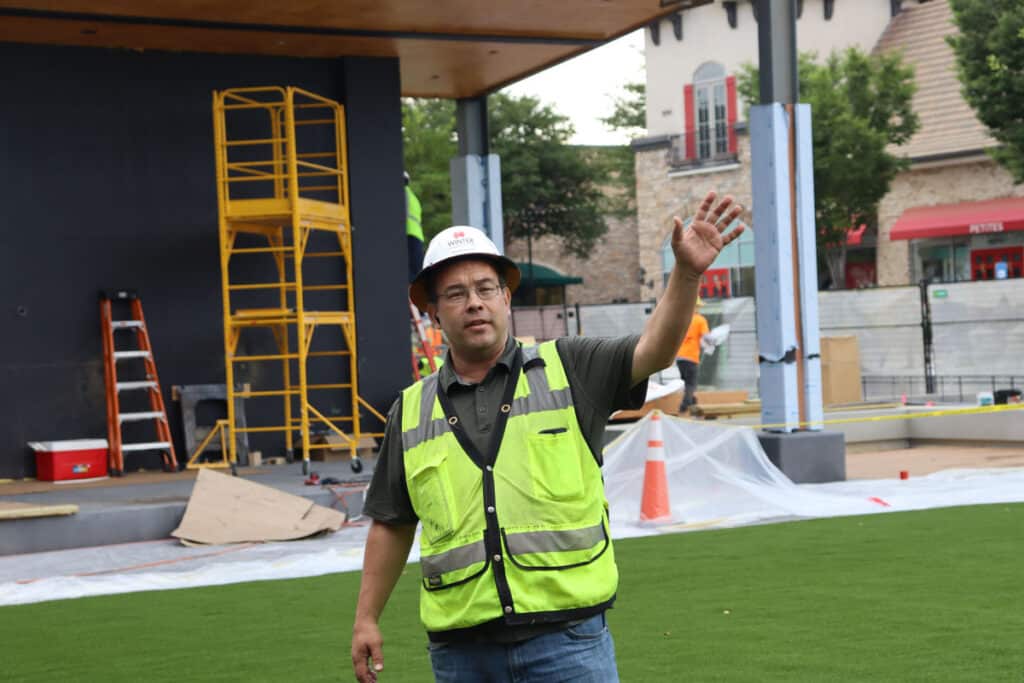
Scrumptious bites incoming
Executives from the development and leasing teams joined on-site management and led attendees around the new central gathering space, guest amenities and Politan Row, the newly created 10,000-square-foot food hall.
Dining concepts from veterans at Sheesh, Twenty-Six Thai and newbie Gekko Kitchen were the first food vendors announced for the space, which is expected to open in January.
“We can’t wait to introduce the Peachtree Corners community to our food hall experience,” said Politan Group CEO Will Donaldson in a news release. “Every detail from the design to the bar program to the cuisine is thoughtfully curated to inspire guests to not only mingle with one another but to connect with our incredible restaurateurs and discover new favorites.”
During the tour, Donaldson explained that eventually there will be seven different global cuisines in the Politan Row food court at the Forum featuring well-known and up-and-coming local talent. Once complete there will be a central bar, a private event venue and a covered outdoor patio.
“One of the things that we’re excited about is this unique design that we’ve come up with, that’s very specific to this area,” he said. “We’ll be open seven days a week for lunch and dinner. Whether you’re with a group for lunch or with your family, it works great for multiple settings.”
Twenty-six Thai owner Niki Pattharakositkul said the restaurant will work with local vendors to source the freshest meats and produce possible.
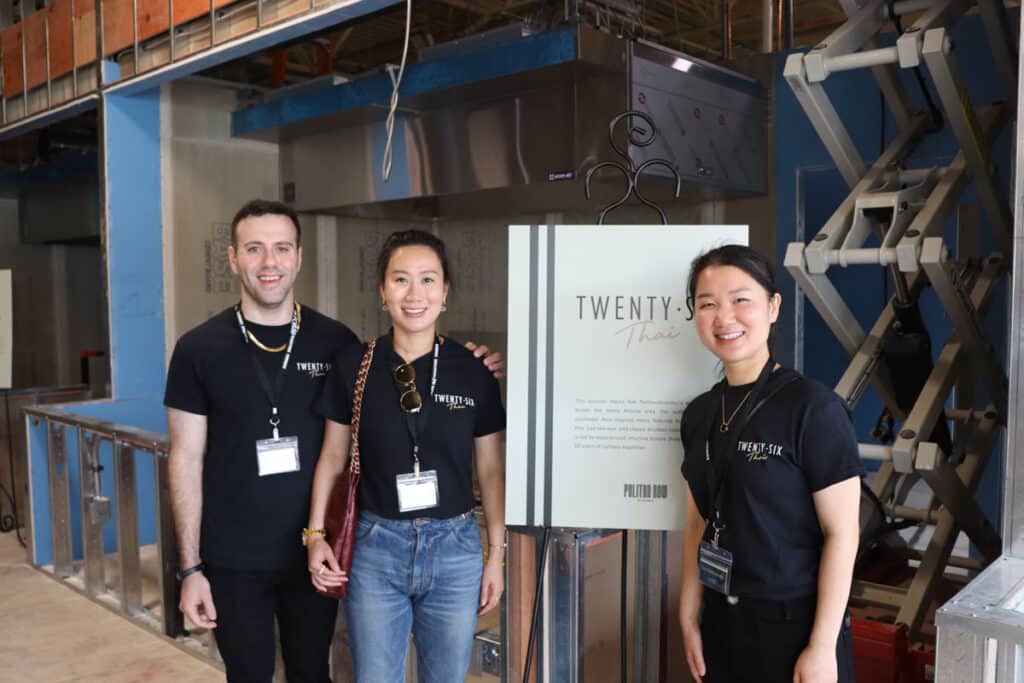
“There are certain types of produce and protein we try to source locally, but sauces and the more exotic produce and herbs, we have to import from Thailand,” she said. “Our brand is trying to move towards doing things locally and sustainably.”
Working with organizations such as Georgia Grown limits the use of large food distribution companies. Since starting Twenty-six Thai in 2016, Pattharakositkul has launched seven locations across metro Atlanta, including at Politan Row’s Ashford Lane and Colony Square.
The eatery describes itself as an “authentic wok-fired Southeast Asia-inspired menu featuring items such as pad Thai, pad see ewe and classic drunken noodles.”
Sheesh, a Mediterranean concept that uses simple, wholesome ingredients prepared with unique spices and blends, is run by corporate executive chef Charlie Sunyapong and director of operations Raquel Stalcup. The two are also members of the group behind full-service restaurants Stäge at Town Center and Pêche at the Forum.
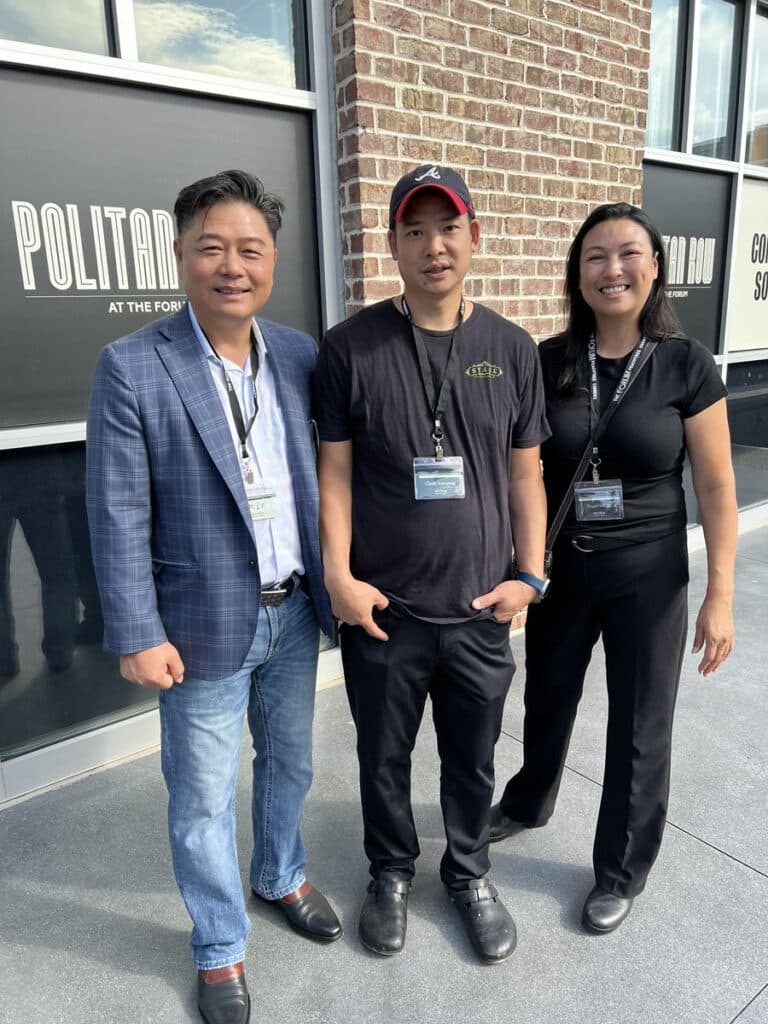
The popularity of those suburban concepts has already taken off. With Sheesh, they’re looking to do something different.
“There are going to be some things that are unique to Sheesh that you’re not going to get at the other places,” said Sunyapong. “You’re not getting a whole restaurant; this is quicker fare.”
Gekko Kitchen, a former food truck transformed into a hibachi and ramen experience, will be serving fresh, fast bowls that are more colorful and lighter than traditional hibachi fare.
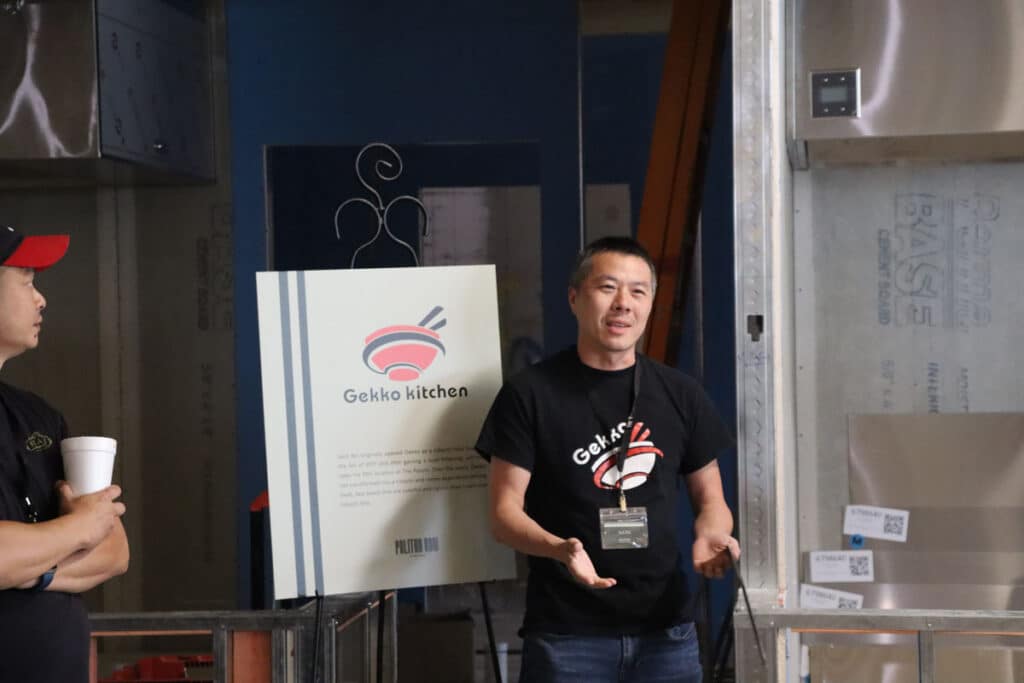
Gathering spots
Development Manager Nick Lombardo explained that NAP is moving away from building big construction projects from scratch like Colony Square in Midtown Atlanta and Avalon in Alpharetta.
“As a company, North American Properties pivoted around 2020 from building big ground-up construction to more redevelopment with already existing properties,” he said. “With the thought of great assets that just need a little more attention Infused into them to create value, we bought the Forum in 2022.”
He said that value-add propositions done at The Forum will create a more walkable center.
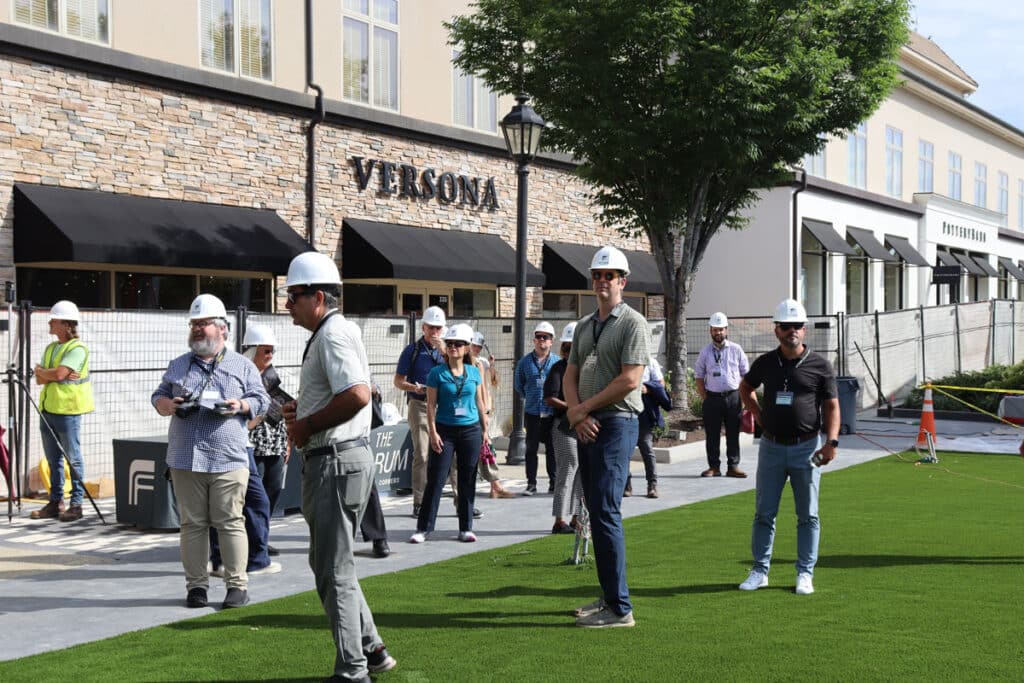
“Trying to compete with the internet on convenience is a very tough task, so the way we differentiate is by experiences,” he said. “We host between 150 to 200 events every year. We have things like concerts, wellness and fitness events and we have child playtime events. Our marketing team does a great job and they’re the differentiator when it comes to what makes our property stand out.”
By the first week of August, a large gathering space will be unveiled in the central area of the property between Pottery Barn and seafood restaurant Pêche. It will have a nine-foot LED screen capable of hosting movie nights and sports viewing. There will also be musical performances featuring local artists.
“We’re not in competition with Town Center,” said Charlotte Hinton, marketing manager at The Forum. “Town Center has gates like a real music festival and we’re more like a ‘chill and enjoy the music’ vibe where you can grab a beer and hang out or maybe kind of walk around.”
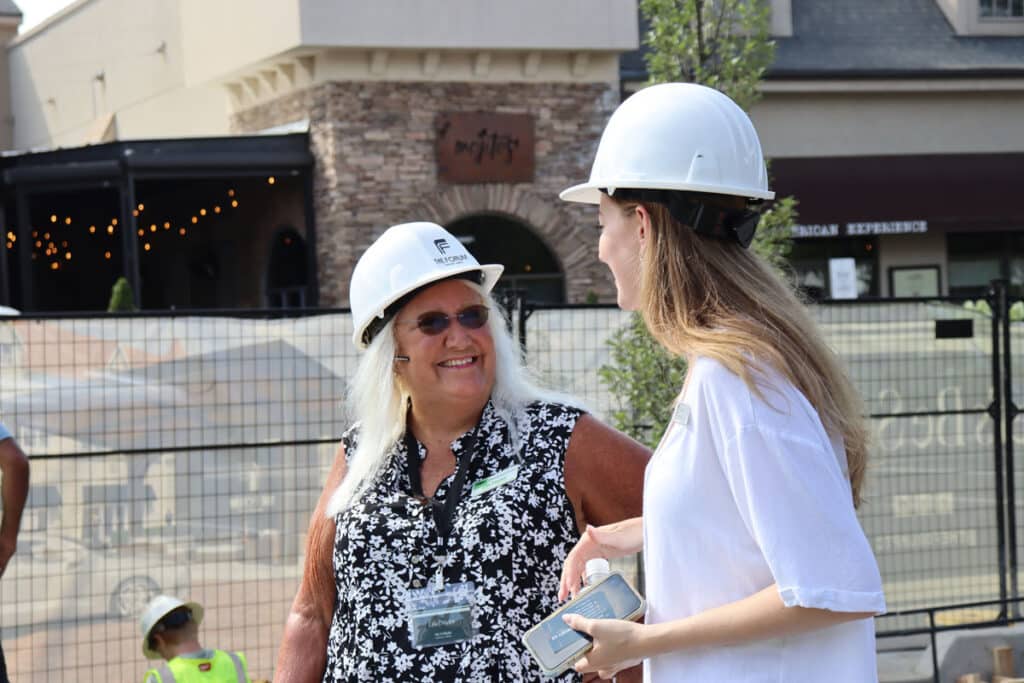
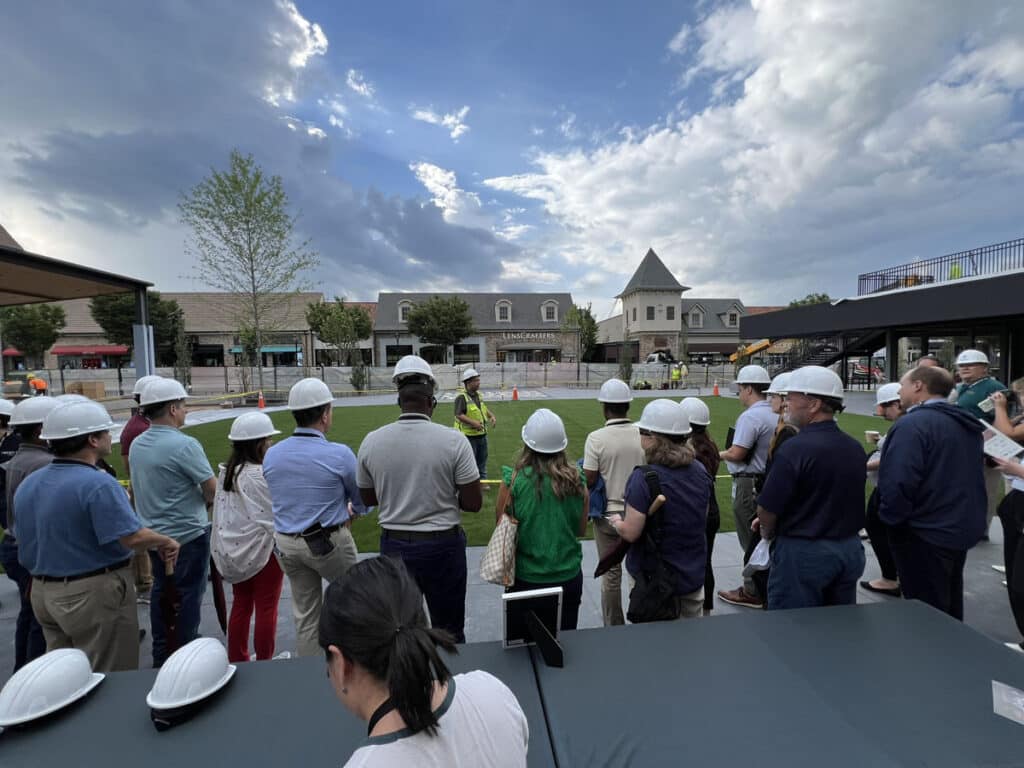
The smaller space and artificial turf are unlike the Town Center space where attendees spread blankets and bring chairs. The Forum will have furniture and seating in the space so folks can just gather and either enjoy time with family or partake in events.
The Forum will also offer valet parking on a limited schedule at that end of the property.
More improvements
Although the construction equipment will have moved out, the jewel box building will house a yet-to-be-named restaurant that will open early next year.
“We’re pretty much done with what we’re doing as far as landlord work,” said Lombardo. “We ask our tenants to bring their brand and their design and their material pallet and put that on the building to express their brand identity. They know their brand better than we do. They know how to best design their building and how it functions and works.”
It’s the same process with retail stores, he added.

“We always ask all of our new tenants to come in here when they’re building their storefront,” he said. “They’re not just selling their clothes; they’re selling a lifestyle in the brand so we ask them to push their brand out to the street.”
Even with the new spaces, there will be no shortage of parking, Lombardo added. “There’s plenty of parking behind these buildings,” he said pointing toward Pêche. “What we’ve done is enhance the connectivity to those areas. We’ve redone this breezeway and we’re adding lighting and connecting the parking lot to the main boulevard here. The goal is to replace cars with people and activity and bring a sense of community to the property.”
Related
Business
Taste of Peachtree Corners: PCBA Showcases Local Restaurants
Published
1 week agoon
July 17, 2024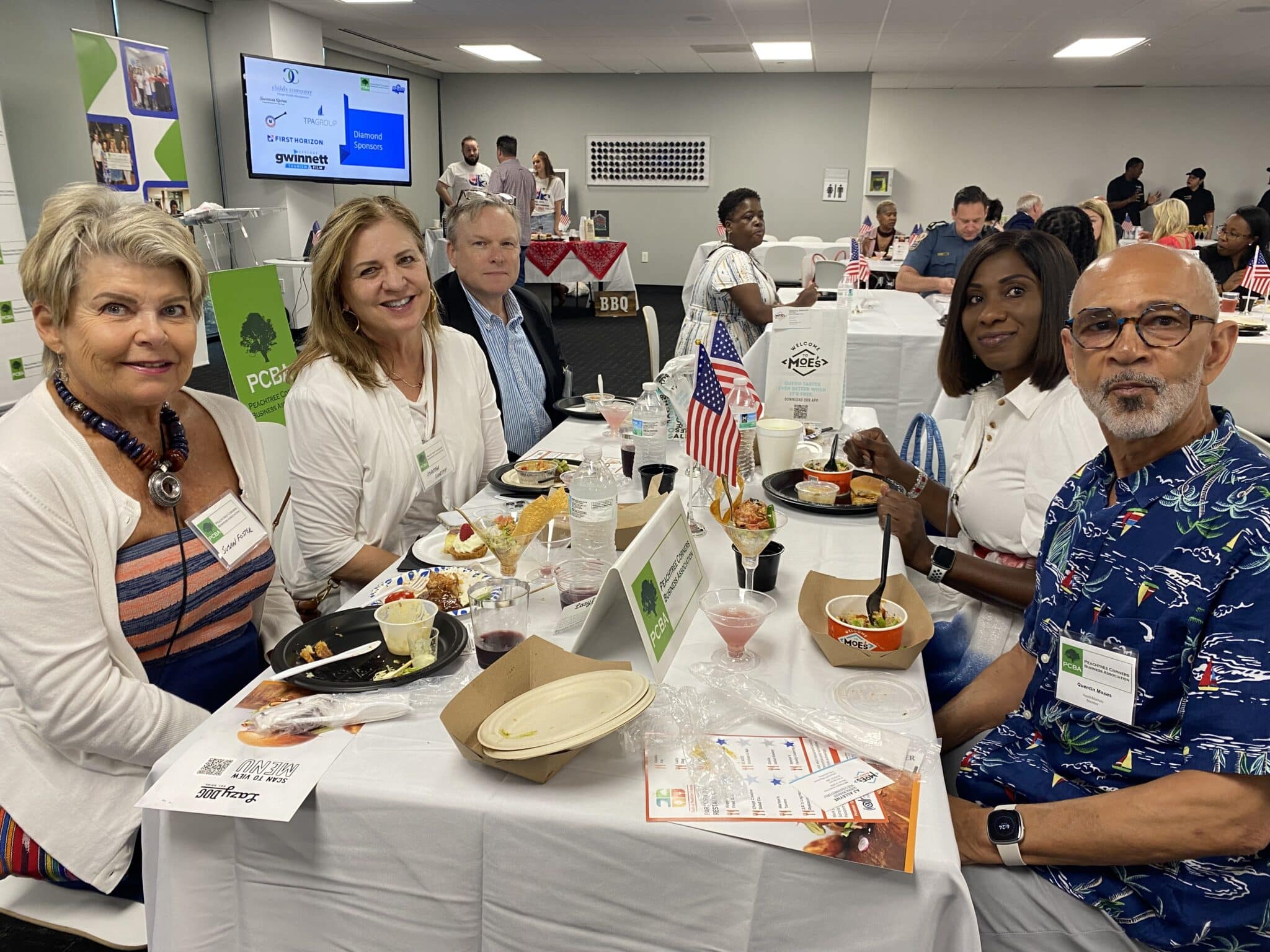
The Taste of Peachtree Corners has been in the works for years, but the COVID-19 pandemic put many key events on hold for the Peachtree Corners Business Association (PCBA).
But luckily this year, the dedicated staff of volunteers successfully executed a memorable event and introduced a lot of local business owners to their neighboring restaurants and caterers.
As I walked up to the Community Chest Room at Peachtree Corners City Hall on June 27, there was a line outside the door. I later found out that over 100 people had registered to attend the event. I got checked in quickly and was faced with a “passport” of 10 Peachtree Corners restaurants serving everything from high-end bakery items to good old-fashioned barbecue, and modern twists on seafood and American cuisines.
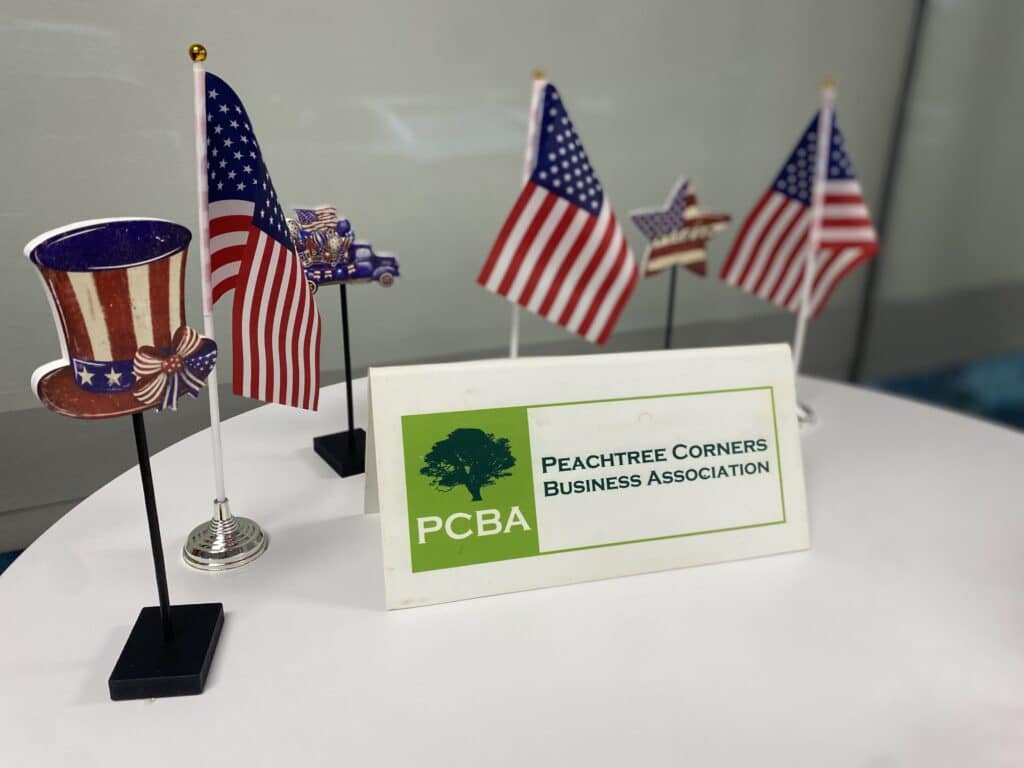
Let’s talk about the food
The idea was to visit all 10 restaurants and collect stars while trying samples and small plates. My first stop was Firebirds Wood Fired Grill, and they had my favorite – homemade chips and queso. The queso was smoky and mildly spicy with a great depth of flavor. What a great start. Next up was Chopt. Creative Salad Co. I had never heard of this restaurant before, but they blew me away with a perfect amuse-bouche of cherry tomato, pesto, mozzarella, and olive oil. These guys understand simple and fresh Mediterranean flavors.
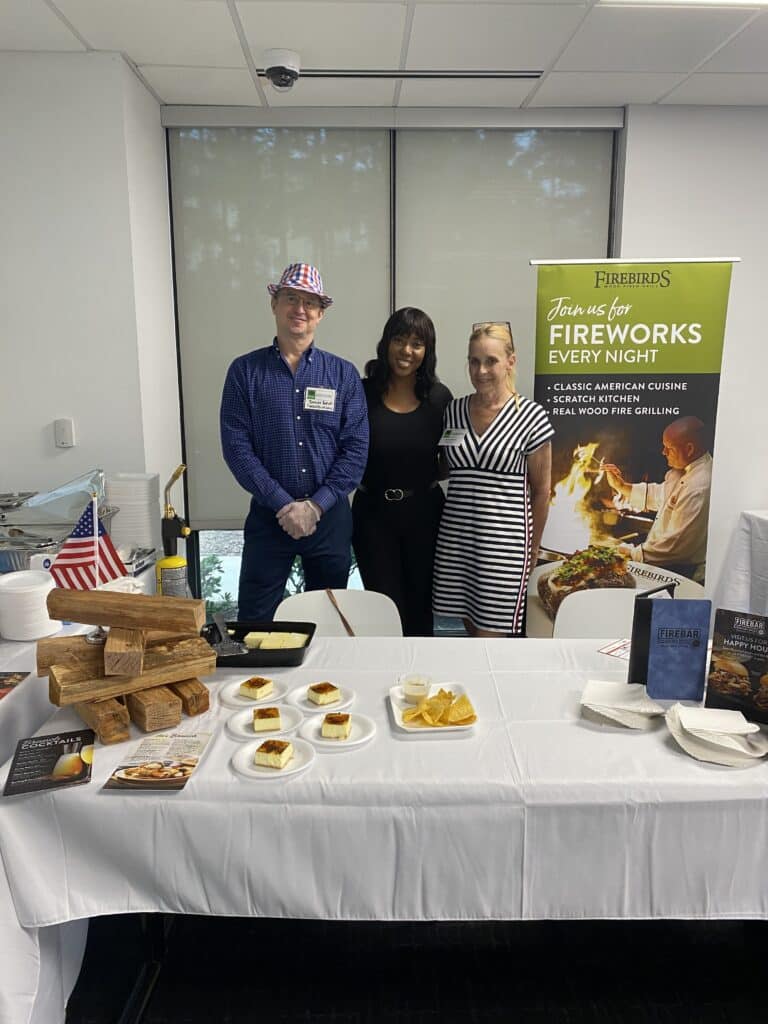
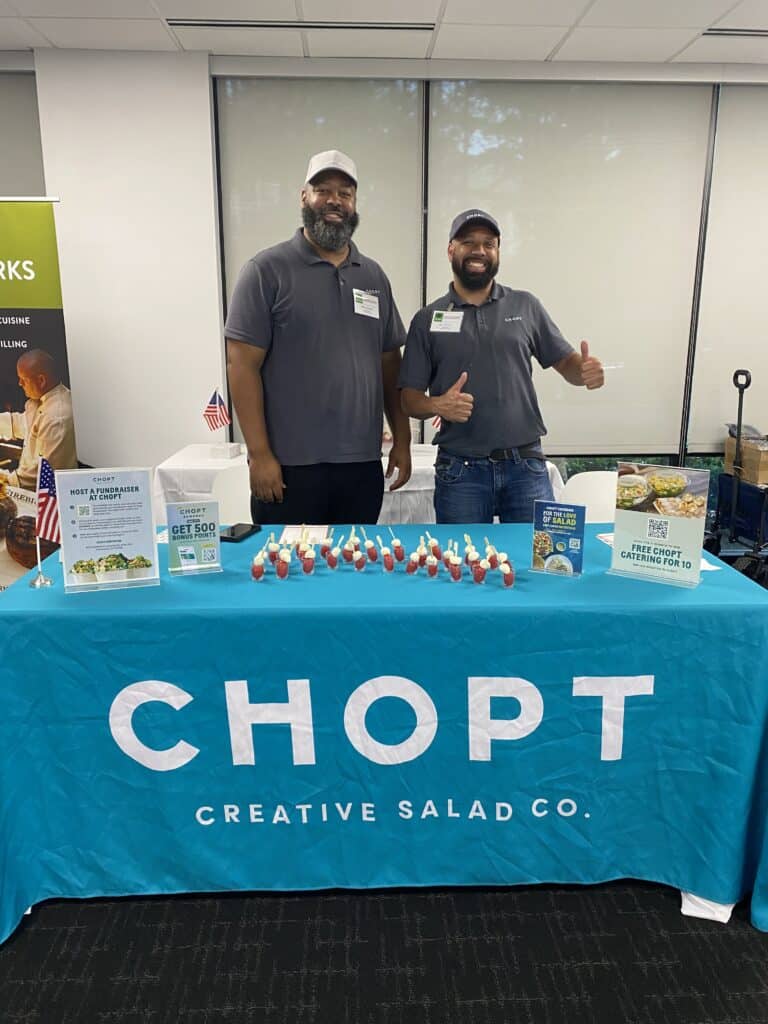

The folks from Marlow’s Tavern were also on-site serving shrimp and grits with jalapeno, spinach and tomato beurre blanc. This is definitely the style of elevated food I’ve come to expect from Marlow’s. And as a nice touch, they prepared a refreshing blueberry cocktail.
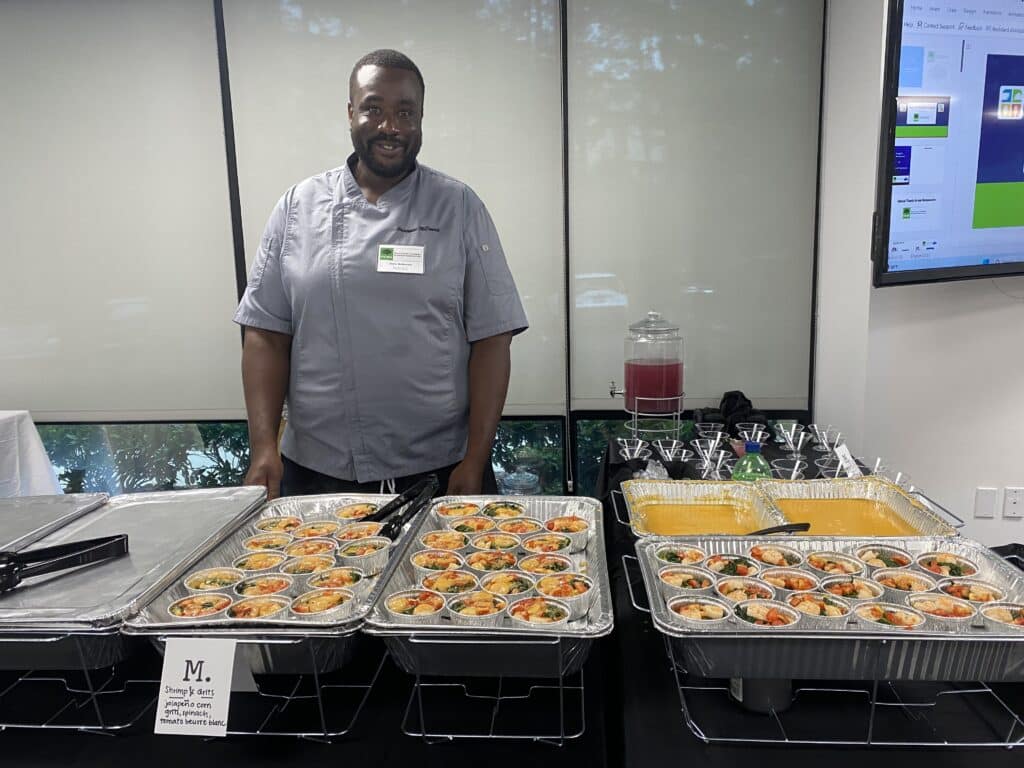
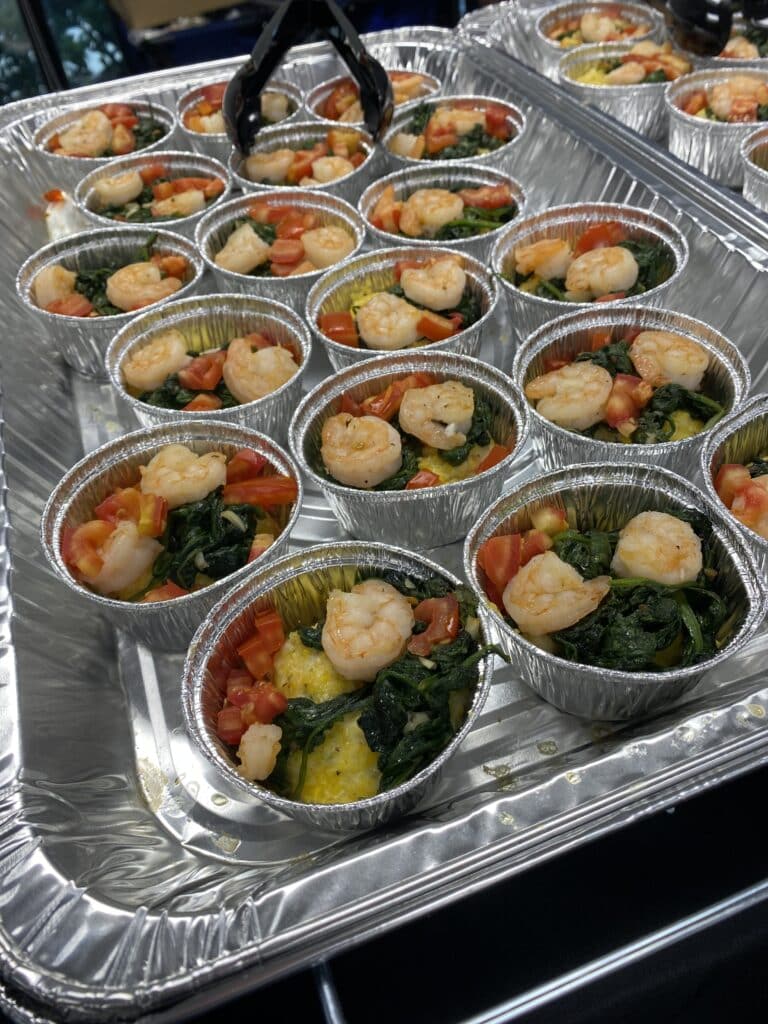
Another familiar face was set up on the other side of the room. J.R.’s Log House Restaurant served southern favorites like pulled pork sliders, baked beans and mac n’ cheese. I couldn’t pass this one up. The pulled pork was tender, tangy and saucy. Exactly what I want from a barbecue. Lazy Dog’s table really impressed me with its presentation. The tuna cup with rice, avocado and chili with chips on the side, was a real stunner.
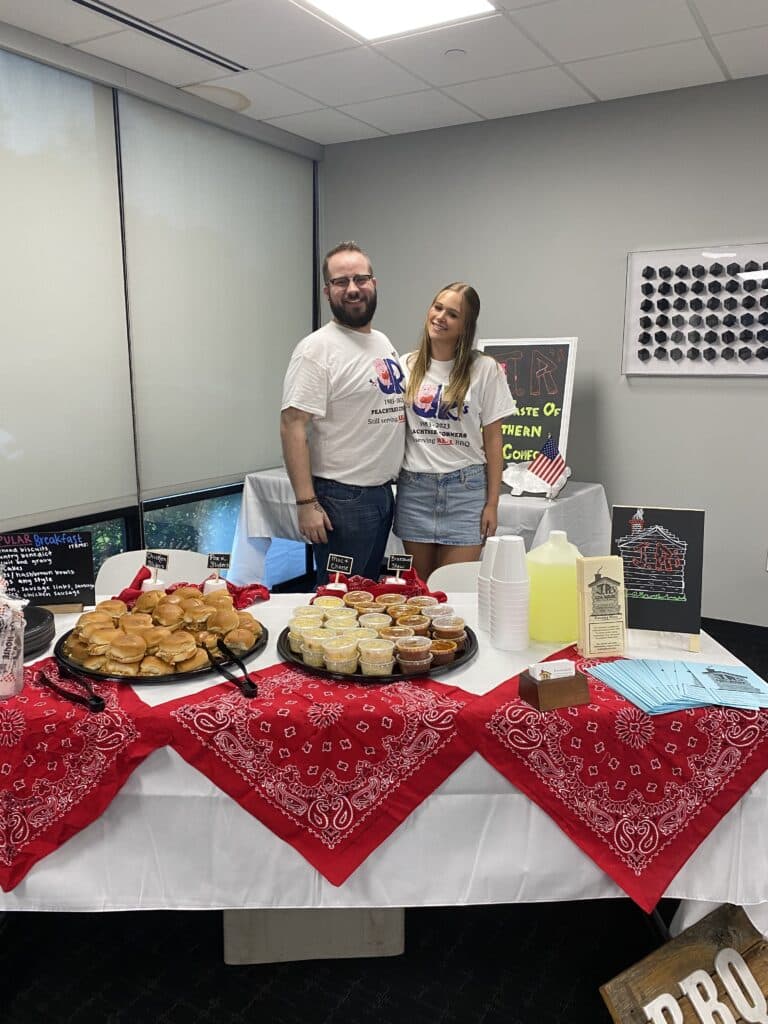
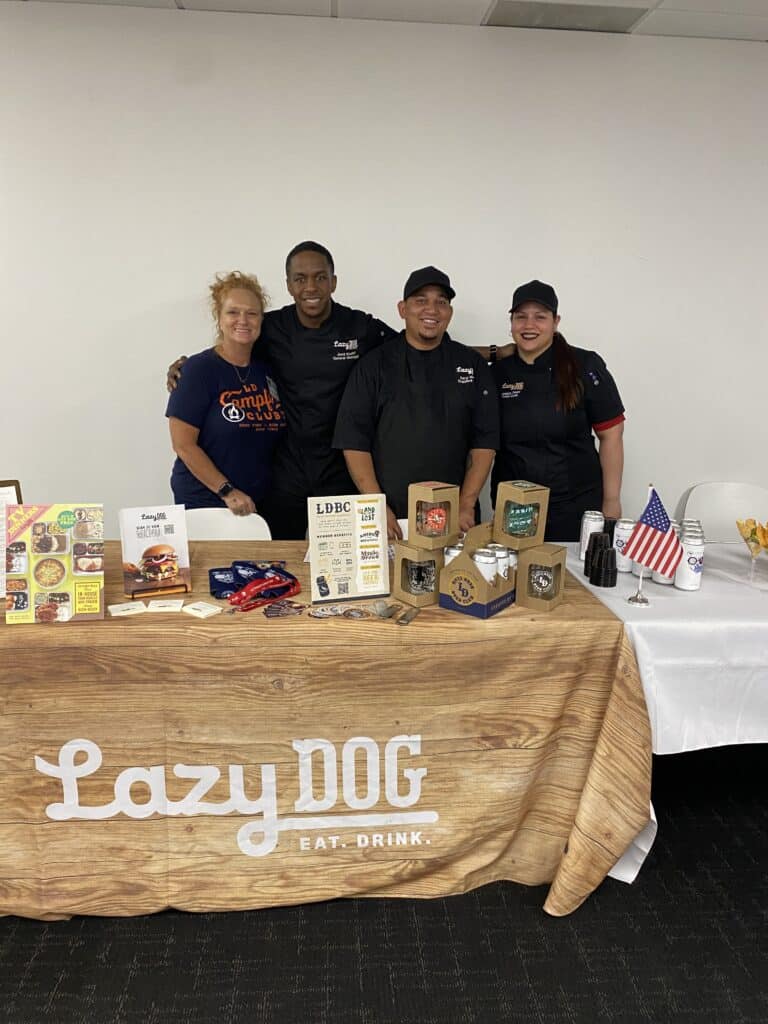
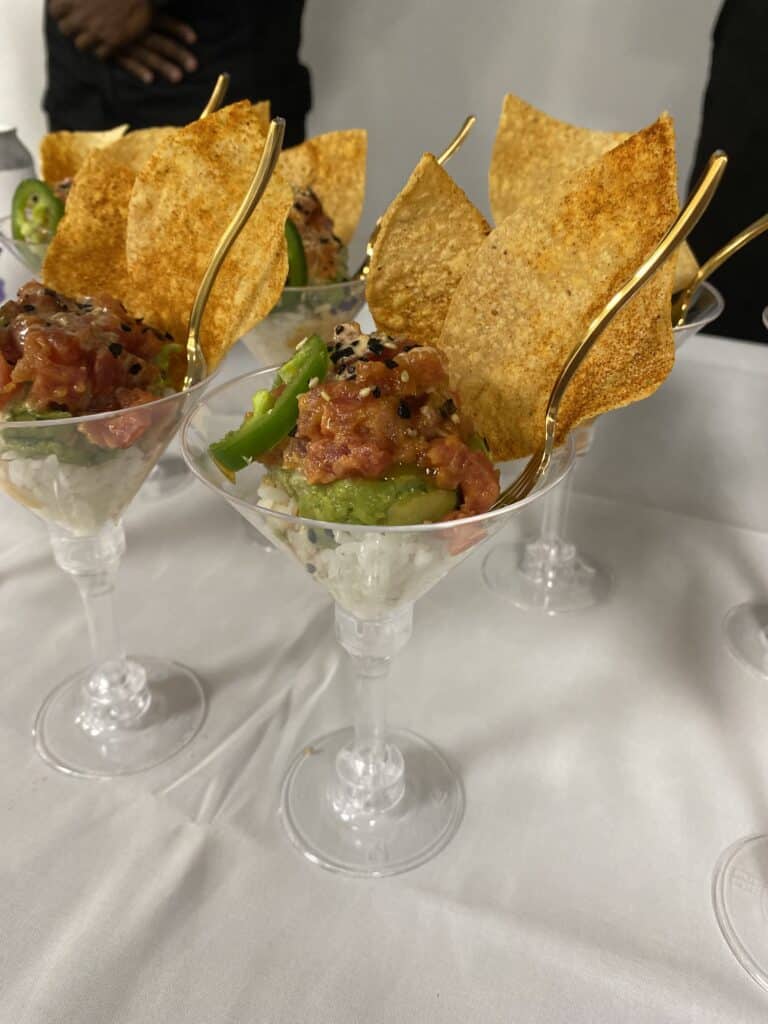
Moe’s Southwest Grill was also on-site handing out tasty tequila lime chicken with rice, avocado, and black beans. This super hearty and comforting entrée was followed by a seafood course from PECHE Modern Coastal. Crab cakes with a croissant pinwheel, roasted garlic and lemon aioli and arugula were on the menu and the flavor combinations were simply fantastic.
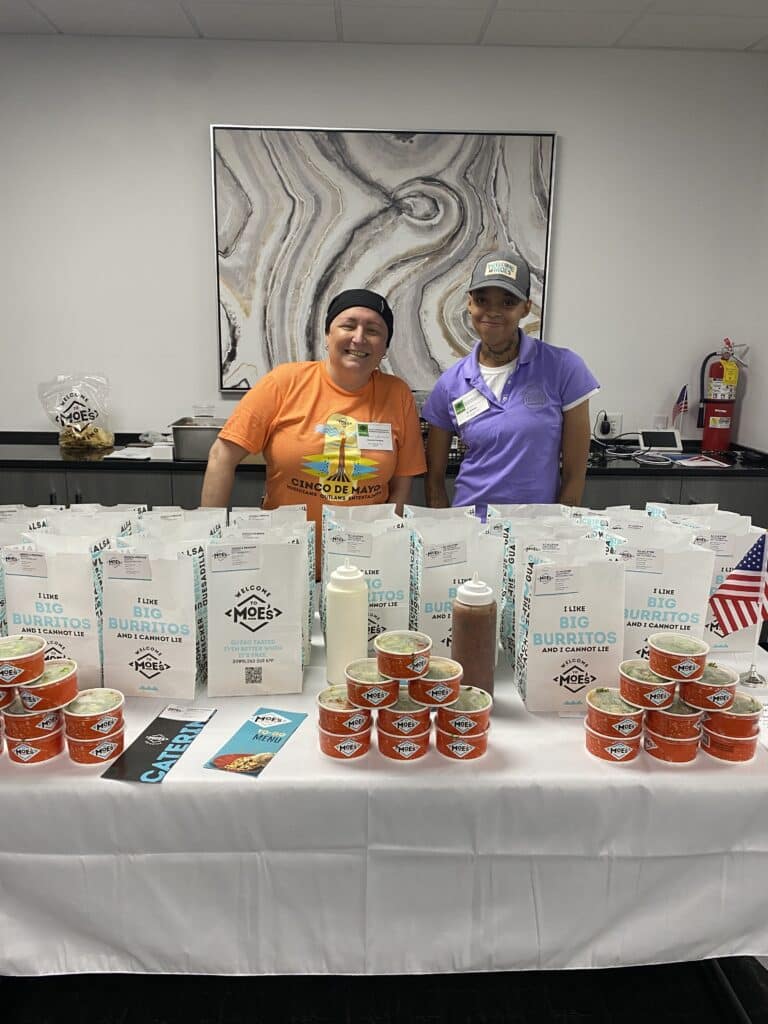
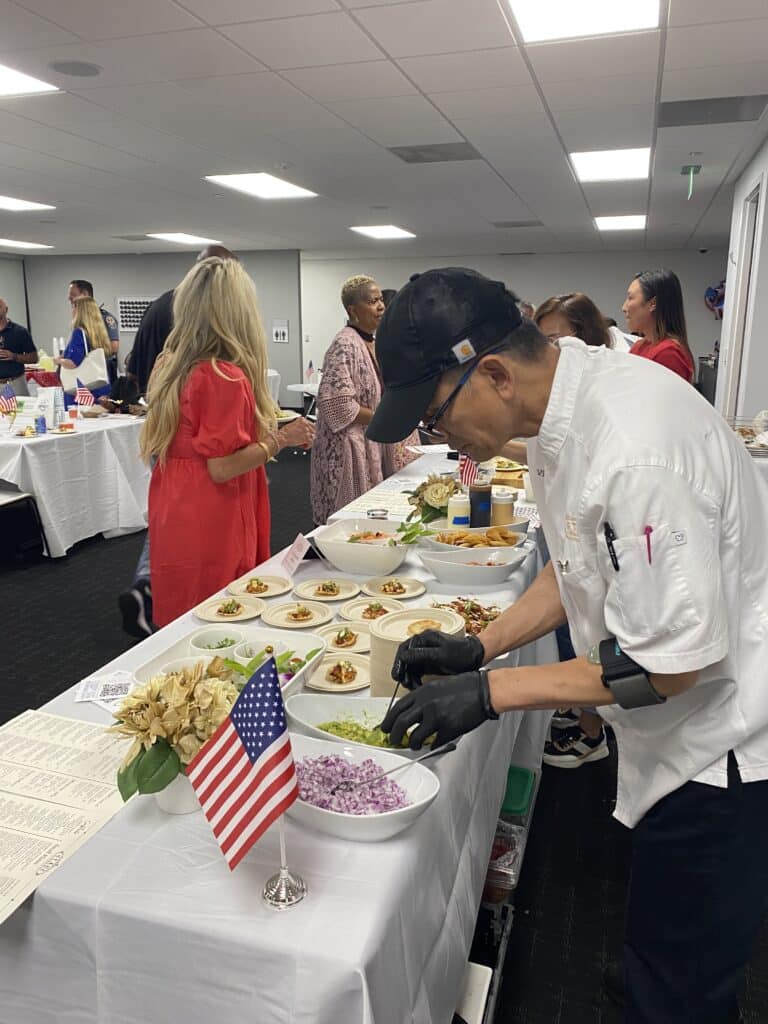
PECHE’s sister restaurant STAGE Kitchen & Bar was next door offering a tuna and salmon tostada with avocado, eel sauce, spicy mayo, and cilantro. This was easily one of my favorite bites of the night. The tostada was crunchy and light with clean and bright flavors. No kidding, I could probably eat this every day for lunch.
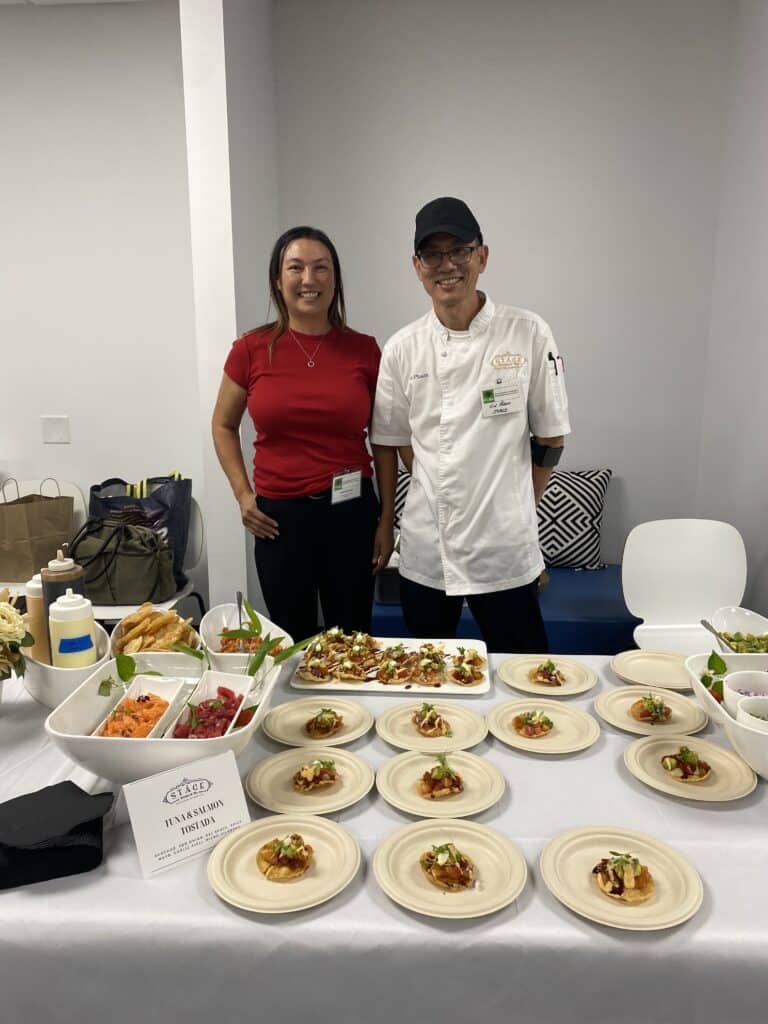
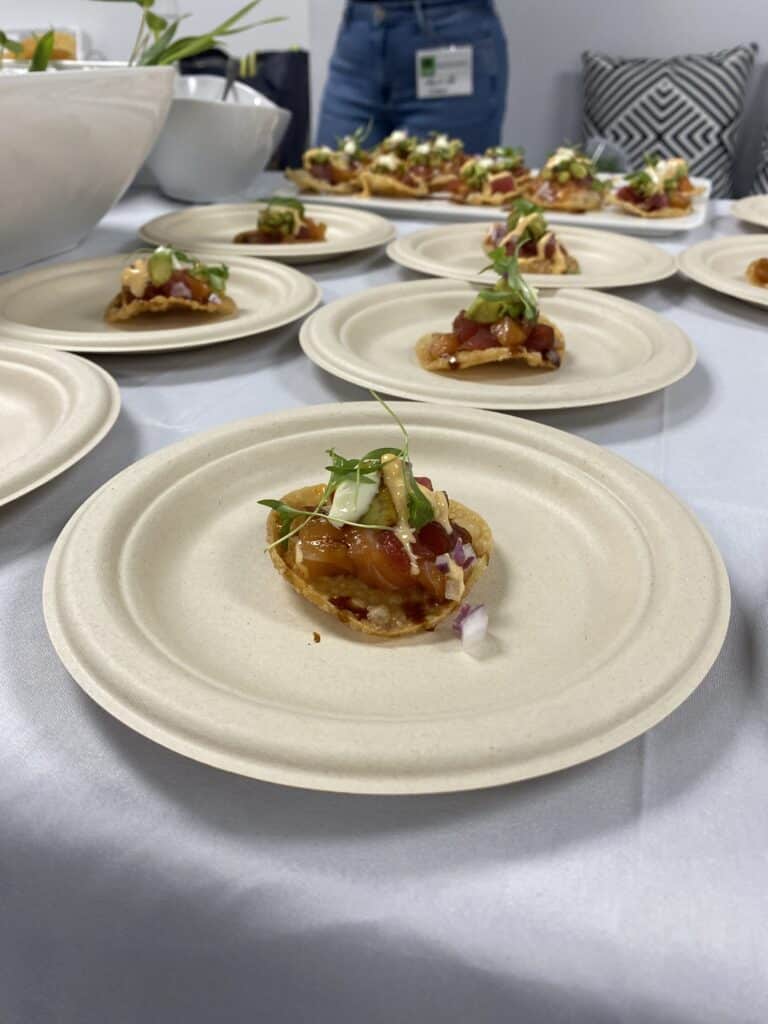
I moved on the Smoke’s Family Catering and owner Phillip Smoke had whipped up enough barbecue to feed an army. I had the pleasure of trying the smoked chicken with potato salad and it was the perfect pairing. Last but not least: dessert. I capped off the evening with a beautiful chocolate ganache-filled croissant with perfect lamination and flaky texture.
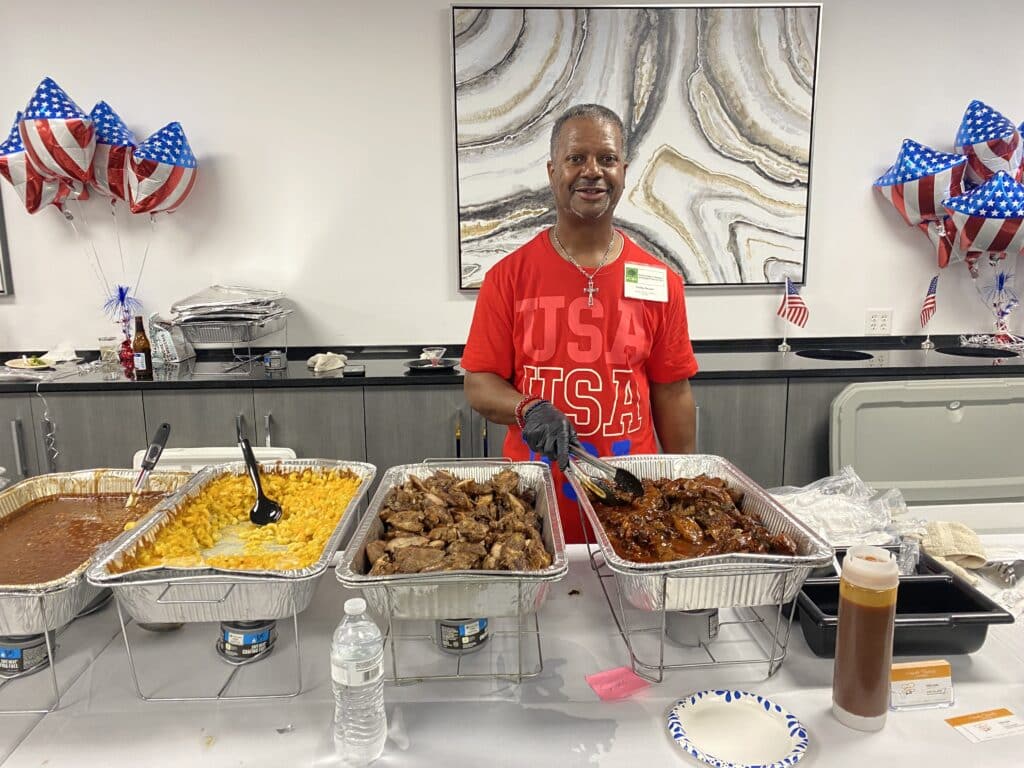
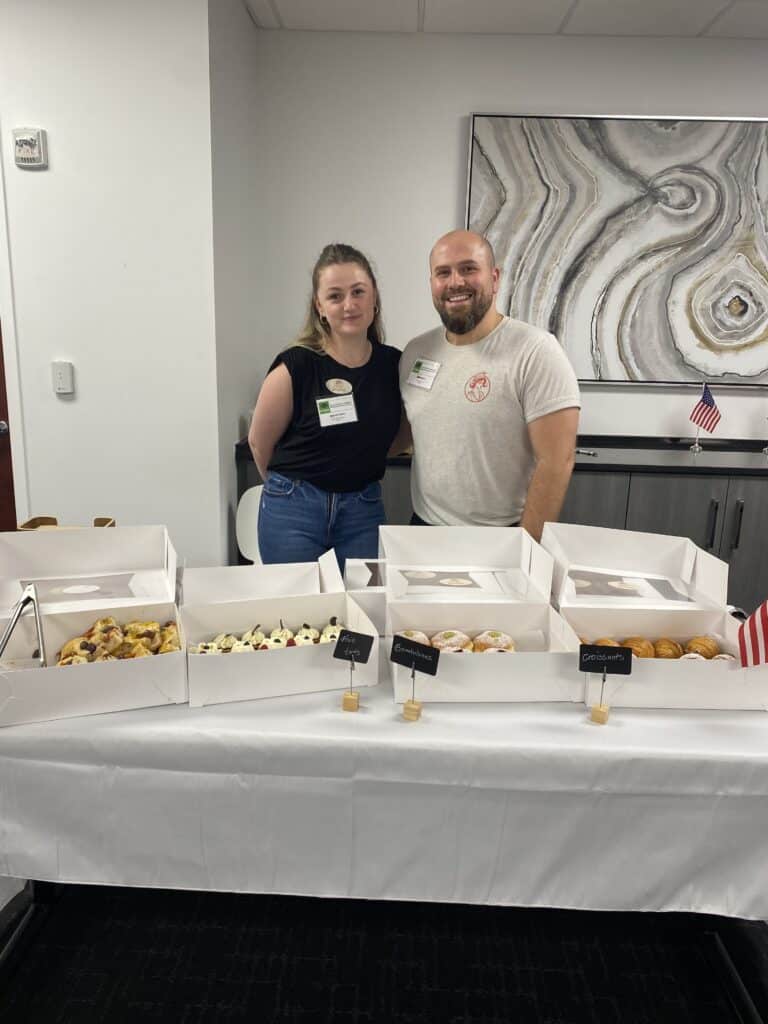
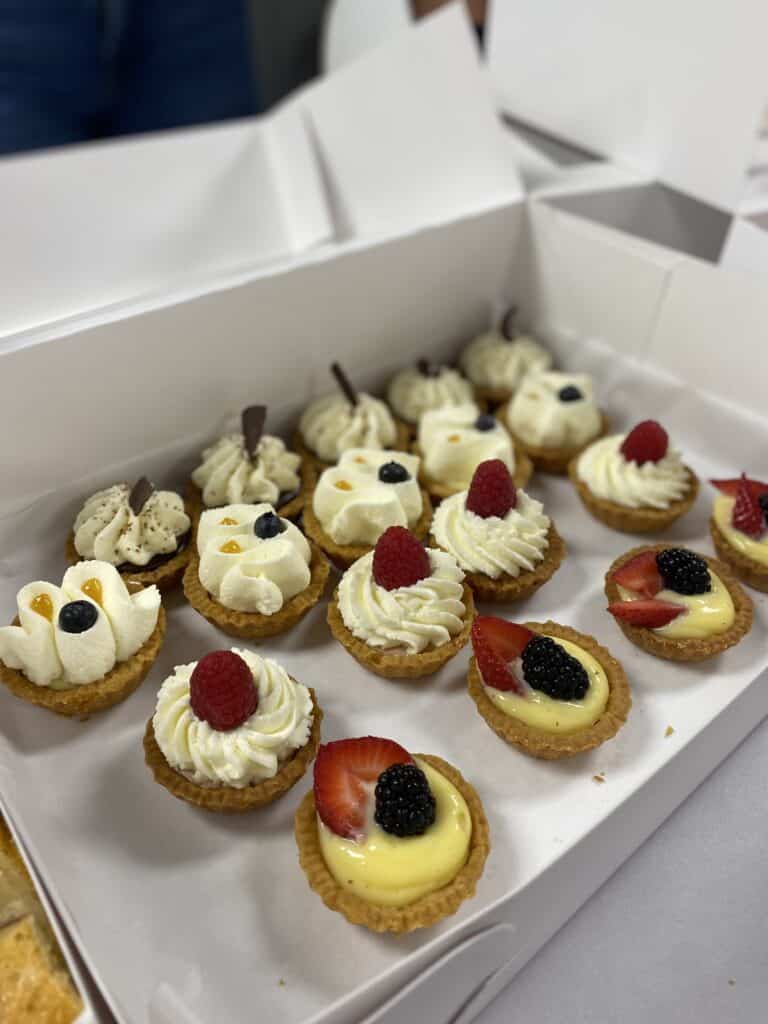
The inspiration behind the event
With a (very) full stomach, I caught up with PCBA President Lisa Proctor to talk about the event.
“We knew that COVID was really hard on a lot of our restaurants to get people back in,” said Proctor. “We wanted to do it in June because we wanted to celebrate our military. Everybody remembers them maybe on Memorial Day or different things, but June is the 80th anniversary of D-Day.”
“The military is always close to our heart,” she added. “We’re also very proud of our restaurants. They all have gone above and beyond.”
Tonight, the PCBA was honoring the Armed Forces and its brave veterans while bestowing two donation checks to very worthy causes.
The first check for $500 went to Folds of Honor. Since 2007, Folds of Honor has provided life-changing scholarships to the spouses and children of America’s fallen or disabled military. And now, their mission expands to the families of America’s first responders.
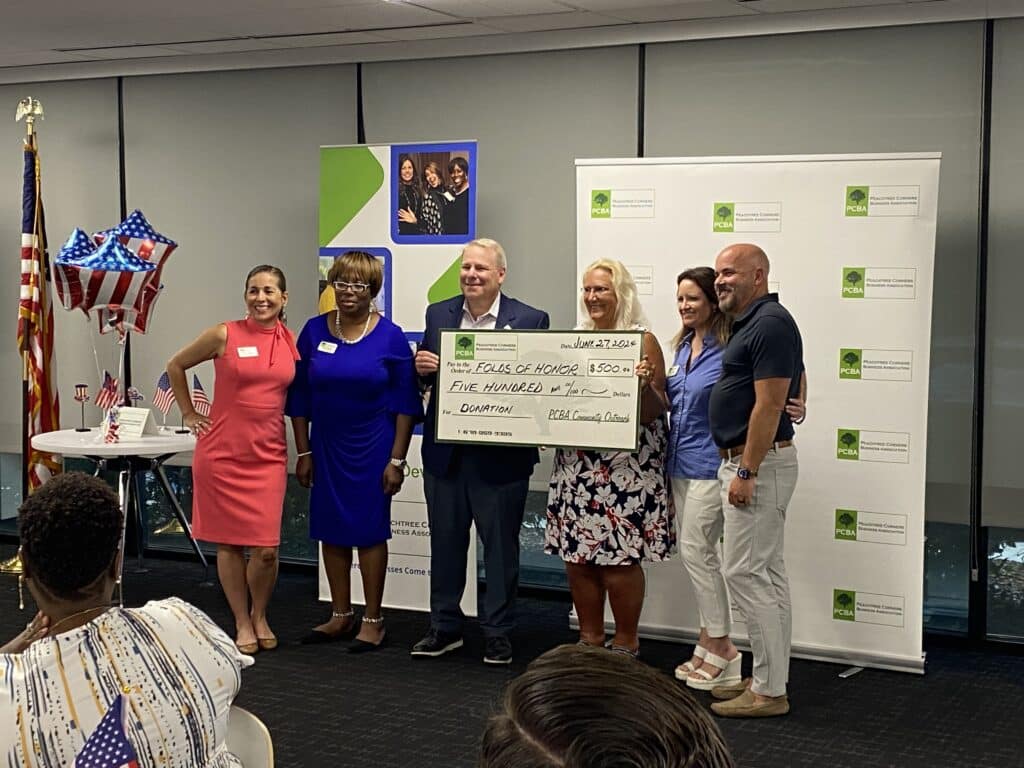
The second check for $500 was given to Light Up the Corners, a 501(c)(3) volunteer organization with an annual glowing, flashing, blinking, shining, nighttime running party and fundraiser in one. All proceeds from the event go to benefit less fortunate children and families in the Peachtree Corners community who are struggling by giving them the chance to participate in life-enhancing programs and activities at the Fowler YMCA.

Over the past 12 years, the PCBA has awarded 19 scholarships and donated more than $156,000+ back to the Peachtree Corners community.
Related
Business
Local Resident Opens AtWork Location in Peachtree Corners
Published
2 weeks agoon
July 10, 2024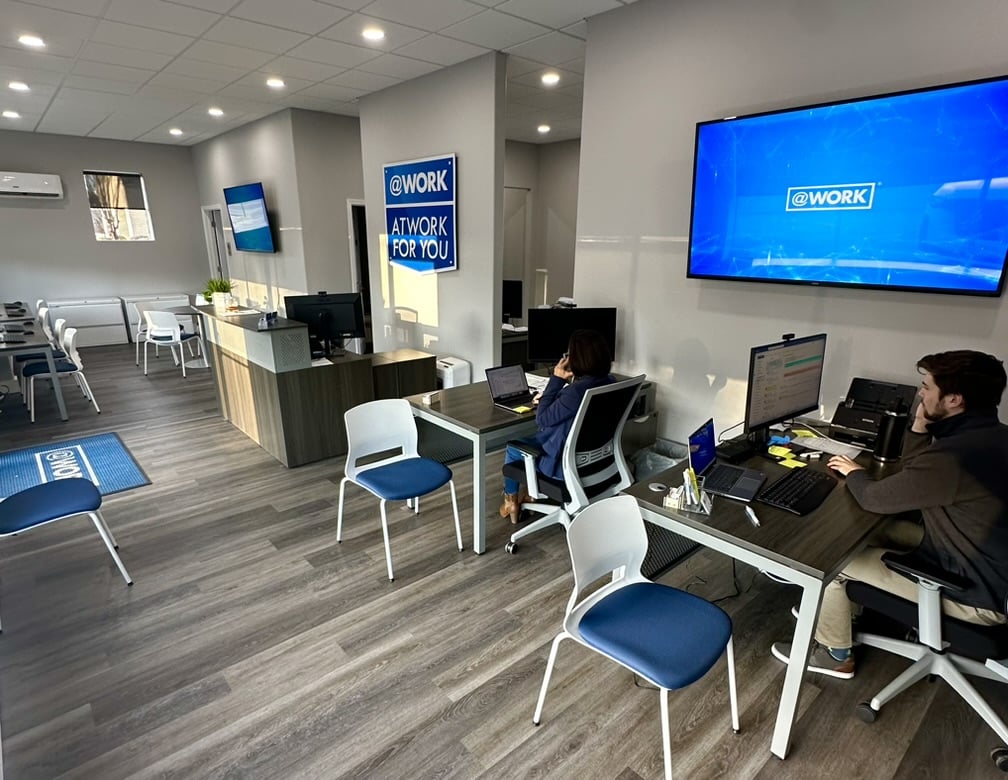
AtWork, one of nation’s leading staffing franchises, has opened its third Metro Atlanta location in Peachtree Corners, Georgia at 6185 Buford Highway, Suite E-100.
AtWork Peachtree Corners is locally-owned by Kamal Bhatia, an immigrant from India with decades of experience in hospitality and as the Senior Vice President of Operations of Atlanta-based Action Bartending School.
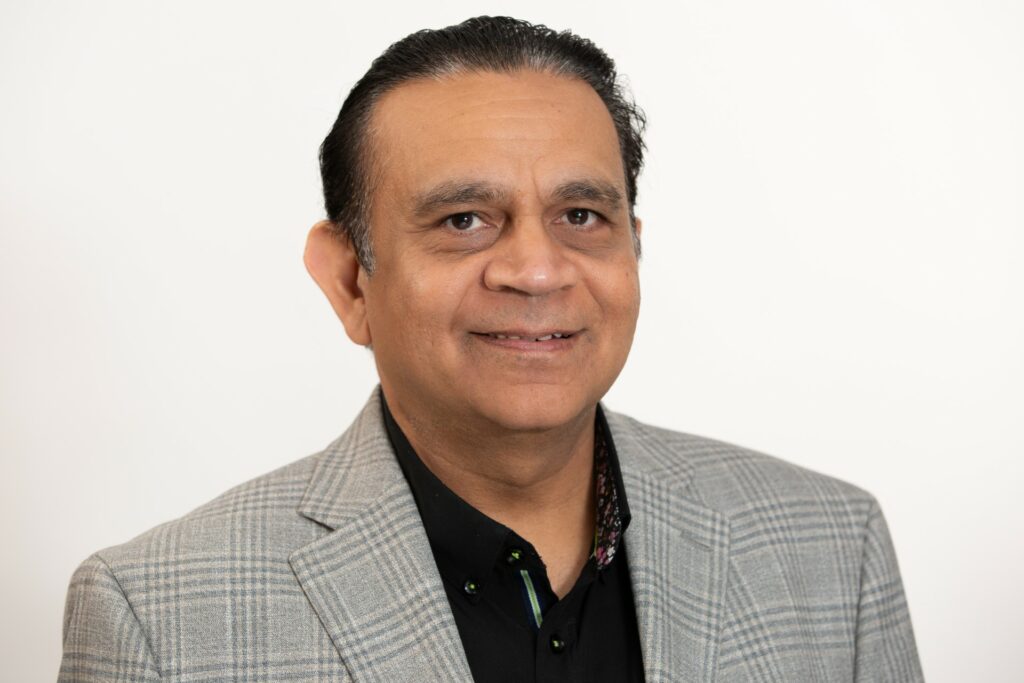
“There is an incredible need for AtWork’s services in Peachtree Corners,” said Bhatia. “Since migrating here in 1996, I’ve witnessed Atlanta evolve and sprout new communities north of the city, including my own. Peachtree Corners has become a hub for thriving businesses, and my goal with this location is to be a key resource between companies and job seekers to support the continued growth of our local economy.”
Bhatia’s son and daughter will assist him in the business.
“This is an opportunity to create a legacy company to ensure our community is supported for generations to come,” he said.
For more than three decades, AtWork’s mission has been to connect people with jobs and jobs with people. With more than 100 locations nationwide, AtWork puts nearly 40,000 individuals to work each year in administrative, light-industrial, accounting and finance, hospitality, IT and management-level positions at some of the nation’s largest and most recognizable companies.
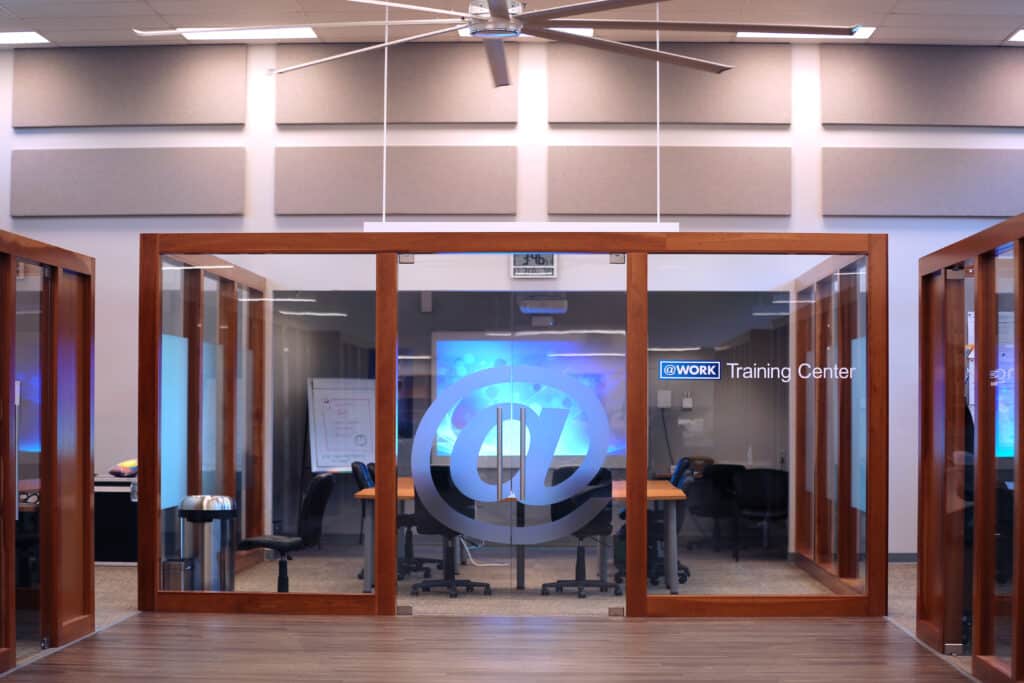
“We’re proud to open our doors in Peachtree Corners and provide a common place for both job seekers and growing businesses to turn for staffing solutions,” said Jason Leverant, President and COO of AtWork.
“AtWork will serve as a key resource to help employees thrive, businesses prosper and communities flourish. Kamal is the perfect partner to champion our mission and be a servant leader in her local community,” he added.
Related
Read the Digital Edition
Subscribe
Keep Up With Peachtree Corners News
Join our mailing list to receive the latest news and updates from our team.
You have Successfully Subscribed!

What’s going on at Jones Bridge Park and the Challenges of Urban Development

Taste of Peachtree Corners: PCBA Showcases Local Restaurants

The Forum Gives Sneak Peek of New Eateries and Community Spaces

Southwest Gwinnett Mayors Share Visions for the Future

8 Events Happening In and Around Peachtree Corners This August

Peachtree Corners Shines Bright with Light Up the Corners Glow Race this August

Peachtree Corners Shines Bright with Light Up the Corners Glow Race this August

The Forum Gives Sneak Peek of New Eateries and Community Spaces

8 Events Happening In and Around Peachtree Corners This August

Southwest Gwinnett Mayors Share Visions for the Future

Taste of Peachtree Corners: PCBA Showcases Local Restaurants

What’s going on at Jones Bridge Park and the Challenges of Urban Development

Local Resident Opens AtWork Location in Peachtree Corners

CHRIS 180 Expands its Services into Gwinnett County [Podcast]

Light up the Corners [Video]

Capitalist Sage: Business Leadership in Your Community [Podcast]

Cliff Bramble: A Culinary Adventure through Italy

Top 10 Brunch Places in Gwinnett County

A Hunger for Hospitality

THE CORNERS EPISODE 3 – BLAXICAN PART 1

Top 10 Indoor Things To Do This Winter

The ED Hour: What it takes to Remove Barriers from Education
Peachtree Corners Life
Topics and Categories
Trending
-
Business1 week ago
Taste of Peachtree Corners: PCBA Showcases Local Restaurants
-
Business2 days ago
The Forum Gives Sneak Peek of New Eateries and Community Spaces
-
City Government4 days ago
Southwest Gwinnett Mayors Share Visions for the Future
-
Around Atlanta4 days ago
8 Events Happening In and Around Peachtree Corners This August


